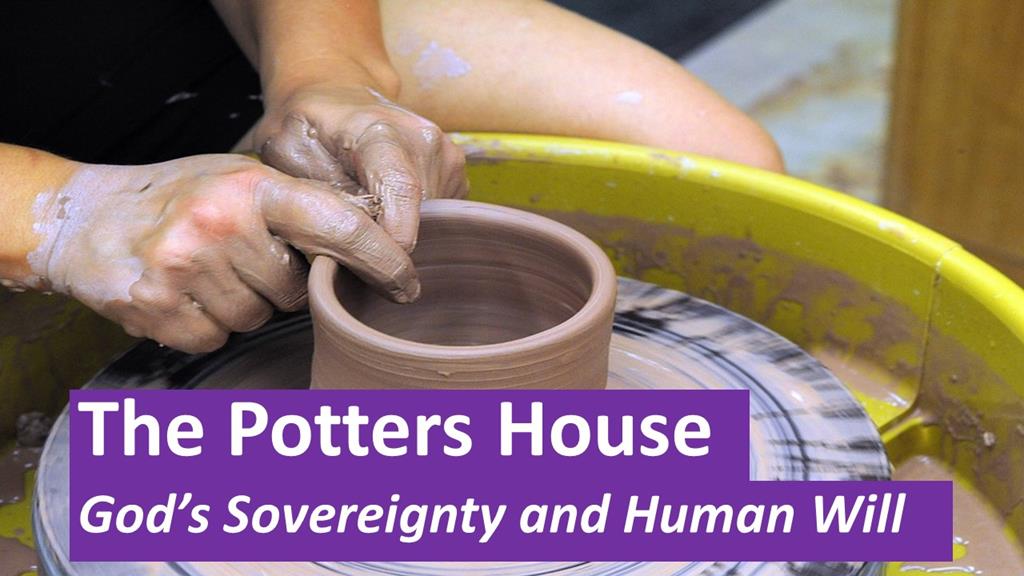 Jeff Garrison
Jeff Garrison
Skidaway Island Presbyterian Church
September 22, 2019
Jeremiah 18:1-12
How many of you have a cabinet at home filled with Tupperware and other such plastic containers? (Raise your hands. Be honest). If your home is like mine, there are a variety of plastic stuff of all sizes. When it comes time to save left-overs, or to pack a lunch for the office, I can always find the size I need. Of course, I then struggle to find the matching lid, but that’s another story. Ponder for a moment what would our lives be like without such containers? How would we get by? Now let’s go back 2500 years.
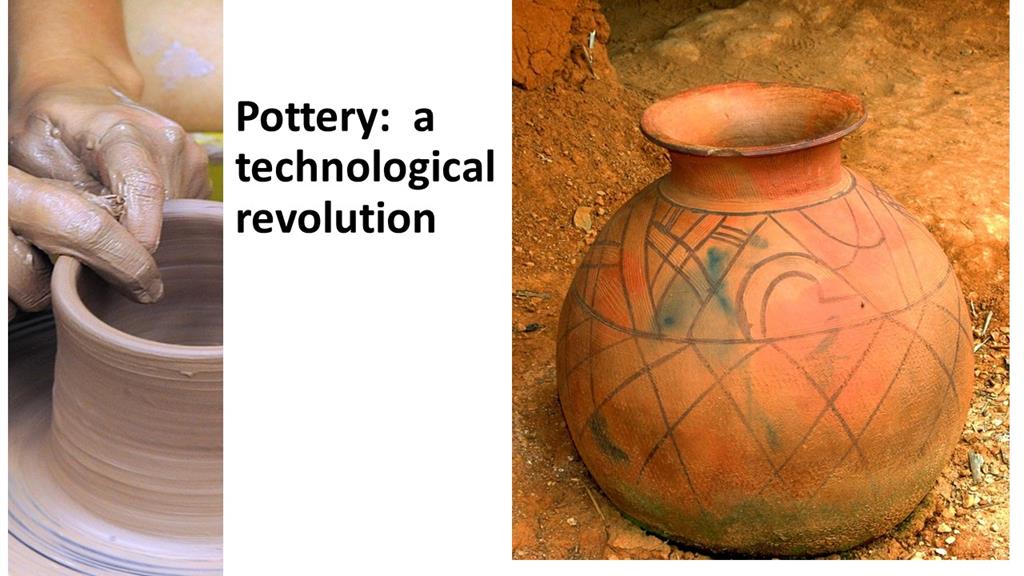 You might be wondering about all this emphasis on pottery as we look at the Prophet Jeremiah. Pottery was a revolutionary technology in the ancient world. It allowed more movement as people could store things in pots, such as water and grain.[1] It provided a better way for cooking. No longer did our ancestors have to roast things over a fire like cavemen. They could make something tasty, adding herbs and spices and making broth. The pottery revolution was one of the great steps in human history that devolved to Tupperware. It allowed our ancestors to settle down. No longer did they have to wander from one source of water and food to another. They could stop and build cities. The potter played an important role in the ancient world. God often uses examples from everyday life to make a point, and with Jeremiah, it was the potter and his work. This morning, we’re visiting the potter’s house. Read Jeremiah 18:1-12.
You might be wondering about all this emphasis on pottery as we look at the Prophet Jeremiah. Pottery was a revolutionary technology in the ancient world. It allowed more movement as people could store things in pots, such as water and grain.[1] It provided a better way for cooking. No longer did our ancestors have to roast things over a fire like cavemen. They could make something tasty, adding herbs and spices and making broth. The pottery revolution was one of the great steps in human history that devolved to Tupperware. It allowed our ancestors to settle down. No longer did they have to wander from one source of water and food to another. They could stop and build cities. The potter played an important role in the ancient world. God often uses examples from everyday life to make a point, and with Jeremiah, it was the potter and his work. This morning, we’re visiting the potter’s house. Read Jeremiah 18:1-12.
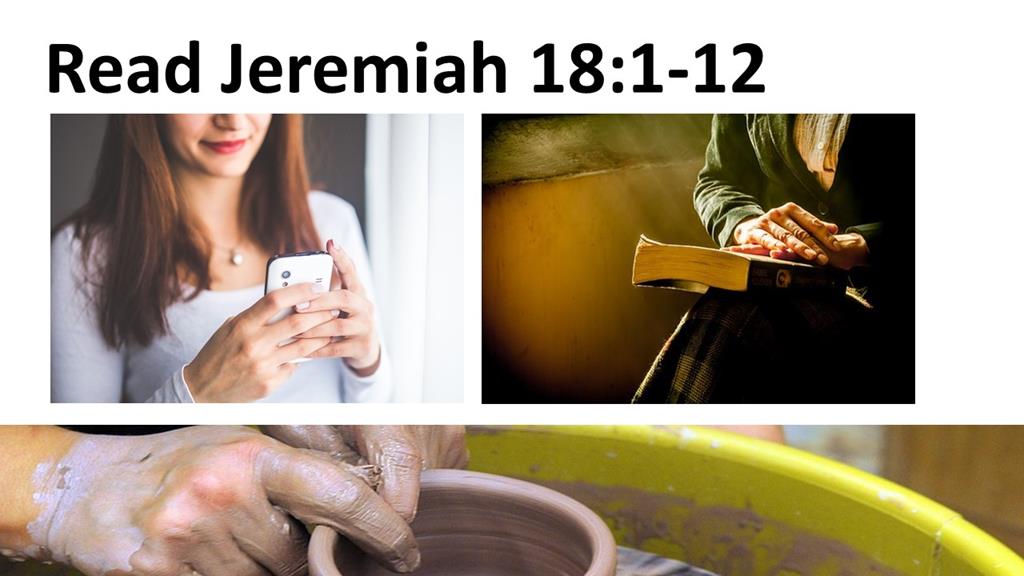
Show Video of Lee Hyong-Gu, Ceramic Master https://www.youtube.com/watch?v=RxpyG6ClIDU (3 minutes 20 seconds)
I love watching a potter shape clay. Don’t you?
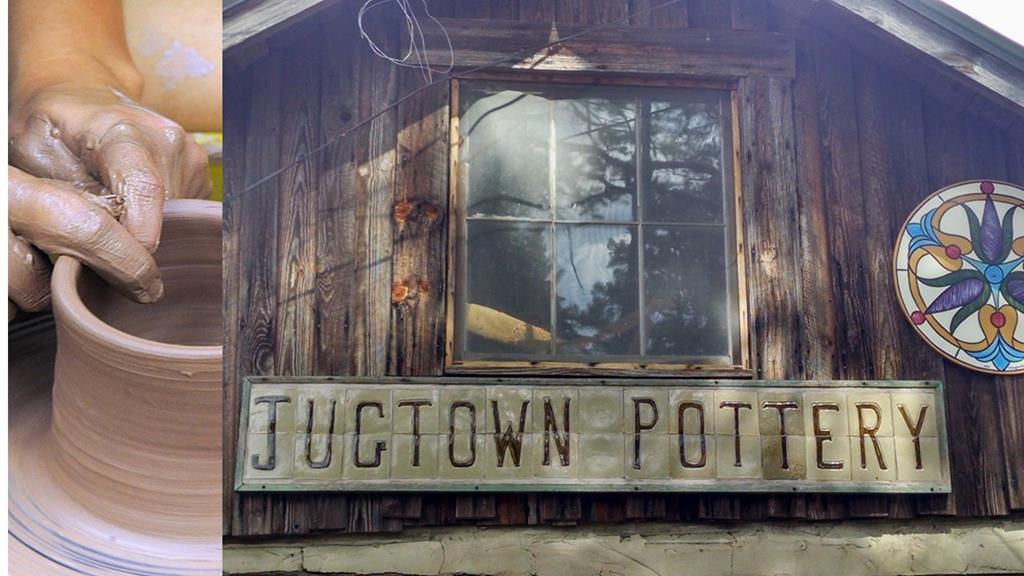 About twenty-five miles northwest of where I was born, where the Carolina Sandhills turn into clay hills, is a dot on the map known as Jugtown. It’s a place I like to visit when I am back in that part of the world. Today, the area around Jugtown and Seagrove is dotted with crafty potters who turn muck into beautiful and useful art. It’s a treat, as we’ve just seen on the video, to watch a potter turn a lump of clay on the wheel into something useful and beautiful.
About twenty-five miles northwest of where I was born, where the Carolina Sandhills turn into clay hills, is a dot on the map known as Jugtown. It’s a place I like to visit when I am back in that part of the world. Today, the area around Jugtown and Seagrove is dotted with crafty potters who turn muck into beautiful and useful art. It’s a treat, as we’ve just seen on the video, to watch a potter turn a lump of clay on the wheel into something useful and beautiful.
 Jugtown received its name, as you can guess, from jugs. The law-abiding folks in the clay hills around there, I’m sure, intended their jugs to store molasses, honey, cane syrup, or something similar. Of course, it was also used to hold liquefied corn (also known as white lightning or moonshine). But with the advent of mason jars, such use of the jugs ceased. But early on, some of the potters had new ideas. In 1917, two of the potters began selling their wares in a store and tea shop in New York City. They emphasized utilitarian pots, things that could be used such as pie plates, crocks, mugs, and bowls. They stamped their unique mark on the bottom of each vessel. Over time, they began to teach new potters the craft and as one generation passed, another took up the wheel. Today, if you go to the area around Jugtown, you’ll find dozens or potters selling their wares. These artists have brought new life into that worthless clay that sticks to your shoes and gums up a plow.
Jugtown received its name, as you can guess, from jugs. The law-abiding folks in the clay hills around there, I’m sure, intended their jugs to store molasses, honey, cane syrup, or something similar. Of course, it was also used to hold liquefied corn (also known as white lightning or moonshine). But with the advent of mason jars, such use of the jugs ceased. But early on, some of the potters had new ideas. In 1917, two of the potters began selling their wares in a store and tea shop in New York City. They emphasized utilitarian pots, things that could be used such as pie plates, crocks, mugs, and bowls. They stamped their unique mark on the bottom of each vessel. Over time, they began to teach new potters the craft and as one generation passed, another took up the wheel. Today, if you go to the area around Jugtown, you’ll find dozens or potters selling their wares. These artists have brought new life into that worthless clay that sticks to your shoes and gums up a plow.
Finding a new purpose is sometimes helpful, and it could make a good moral of this story. But is it really what this passage is about? We need to remember that we’re not the potter, we’re the clay. Our purpose comes from the potter. And while, as this passage shows, the potter wields power over the clay, the clay might not always be suitable. If that’s the case, the potter starts over and creates something that works with the quality of the clay he has. In this passage we see God’s sovereign control, as a new type of pot is created. God’s in control, a fact we’re not always comfortable with.
 Jeremiah is called to the potter’s house where God uses a common image of the ancient world to make a profound message. God’s word comes to him as he watches the potter over and over start off one direction with clay, and it not working, so he reworks the clay into something more suitable. This sounds hopeful. God will continue to work with us until we become a vessel that serves some purpose. One preacher, writing about this text, said that it demonstrates a sovereign God, “not a God of absolute capricious control, but a gracious willingness to change his plan to benefit his flawed people. When God discovers this fatal flaw in his people, he does not simply destroy them; he offers to start over.” [2]
Jeremiah is called to the potter’s house where God uses a common image of the ancient world to make a profound message. God’s word comes to him as he watches the potter over and over start off one direction with clay, and it not working, so he reworks the clay into something more suitable. This sounds hopeful. God will continue to work with us until we become a vessel that serves some purpose. One preacher, writing about this text, said that it demonstrates a sovereign God, “not a God of absolute capricious control, but a gracious willingness to change his plan to benefit his flawed people. When God discovers this fatal flaw in his people, he does not simply destroy them; he offers to start over.” [2]
But there’s a tension in the text that comes in verses 7-11. To make this passage to be only hopeful, we must cut the passage short and stop at verse 6. But that’s not fair to the text. Yes, there is hope in this passage, but the hope is offered to a repentant people who heed the warning that comes at the end of the passage. If they don’t heed the warning, the hope evaporates.
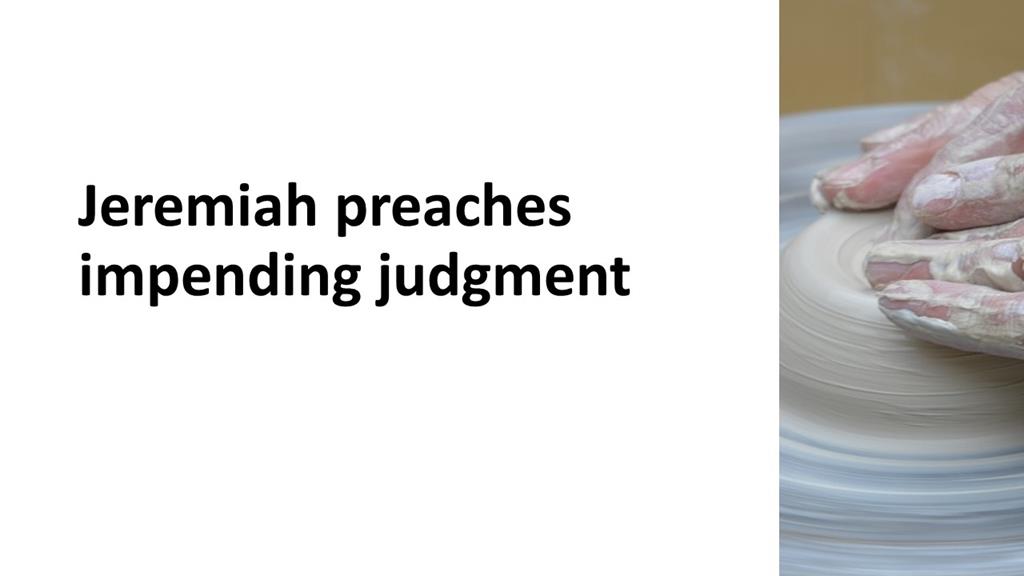 Jeremiah’s task is to preach impending judgment to God’s people. If they don’t shape up, if they don’t stop running around chasing foreign gods and idols, if they act like they’re in control and the God of the Universe is of no matter, they will be punished. Just as the potter can shape a vessel in a new way, they can be handled in a different manner. God can shape another nation to punish. There appears to still time, at this point, for the Hebrew people to change. Later prophecies of Jeremiah hold out no hope of repentance, but here, it’s not too late.[3] But time’s wasting. If they don’t hurry up and repent, it’ll be too late. And as we see in verse 12, the people don’t take Jeremiah’s words seriously. They follow their own plans and act in their own ways. God is not amused.
Jeremiah’s task is to preach impending judgment to God’s people. If they don’t shape up, if they don’t stop running around chasing foreign gods and idols, if they act like they’re in control and the God of the Universe is of no matter, they will be punished. Just as the potter can shape a vessel in a new way, they can be handled in a different manner. God can shape another nation to punish. There appears to still time, at this point, for the Hebrew people to change. Later prophecies of Jeremiah hold out no hope of repentance, but here, it’s not too late.[3] But time’s wasting. If they don’t hurry up and repent, it’ll be too late. And as we see in verse 12, the people don’t take Jeremiah’s words seriously. They follow their own plans and act in their own ways. God is not amused.
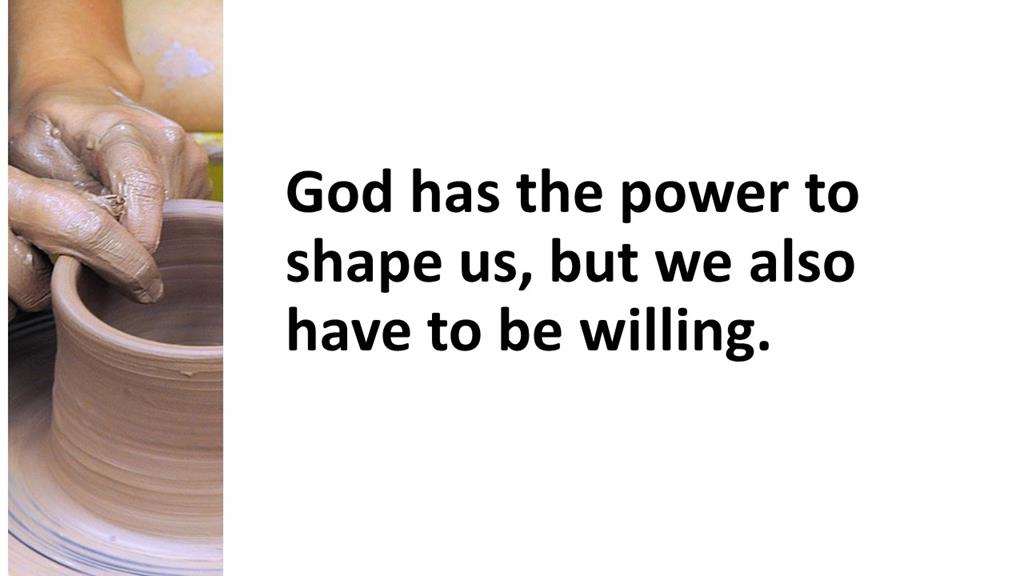 The message of this passage is that God has the power to reshape us, but we must let God work with us. If we resist God’s shaping, we may not be completely crushed, but we won’t fulfill the potential for which we were designed. The intention of our passage isn’t to be fatalistic and say we have no control. Instead, it’s a warning that we’re to work with God and not against him.
The message of this passage is that God has the power to reshape us, but we must let God work with us. If we resist God’s shaping, we may not be completely crushed, but we won’t fulfill the potential for which we were designed. The intention of our passage isn’t to be fatalistic and say we have no control. Instead, it’s a warning that we’re to work with God and not against him.
We often look at Scripture through our individualistic lens, and there’s no doubt that God has control over us as individuals, but it’s important for us to understand that this passage isn’t about a person, but about a people. God’s people. Today, we could apply this passage to the church. Those of us in mainline denominations often feel the church is being pulling apart. But using this analogy, we can see that perhaps the church is just being reshaped. If that’s the case, we need to look beyond our own perceived needs within the church, and to look where God needs the church within the world. That’s the hard task the Session has before it. It’s not what we can do to please the most people, but what we should be doing to join in God’s work.
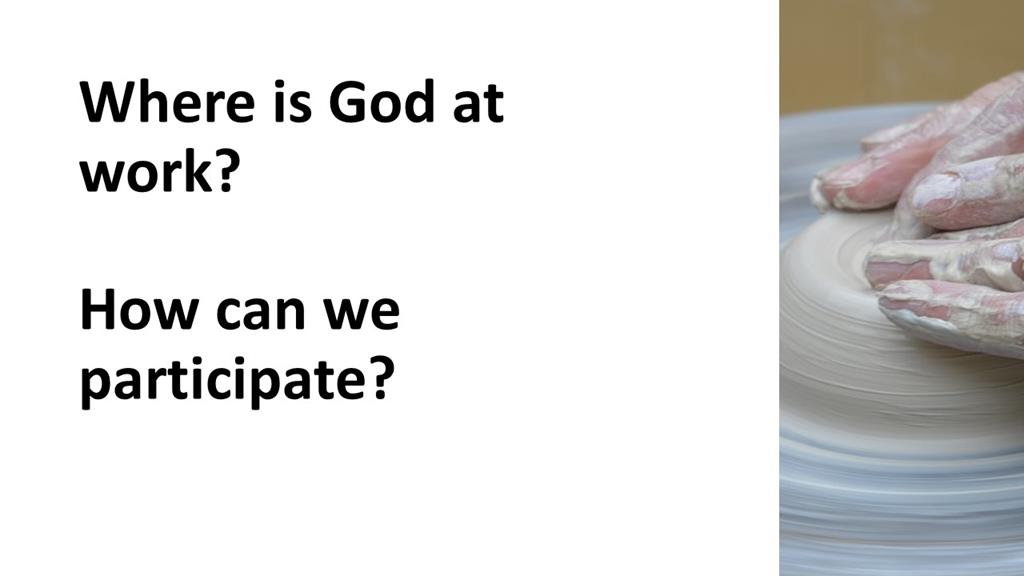 When you leave this sanctuary today, ponder these questions: Where is God at work in the world? How can we participate? How can we be the clay that trusts the potter? Amen.
When you leave this sanctuary today, ponder these questions: Where is God at work in the world? How can we participate? How can we be the clay that trusts the potter? Amen.
©2019
[1] Eugene H. Peterson, Run with the Horses: The Quest for Life at Its Best, (Downers Grove, IL: Intervarsity Press, 1983), 76-77.
[2] Stan Mast, Old Testament Lectionary for September 2, 2019: Jeremiah 18:1-11” published by the Center for Excellence in Preaching: https://cep.calvinseminary.edu/sermon-starters/proper-18c-2/?type=old_testament_lectionary
[3] John Bright, The Anchor Bible: Jeremiah (New York: Doubleday, 1965), 124-125.

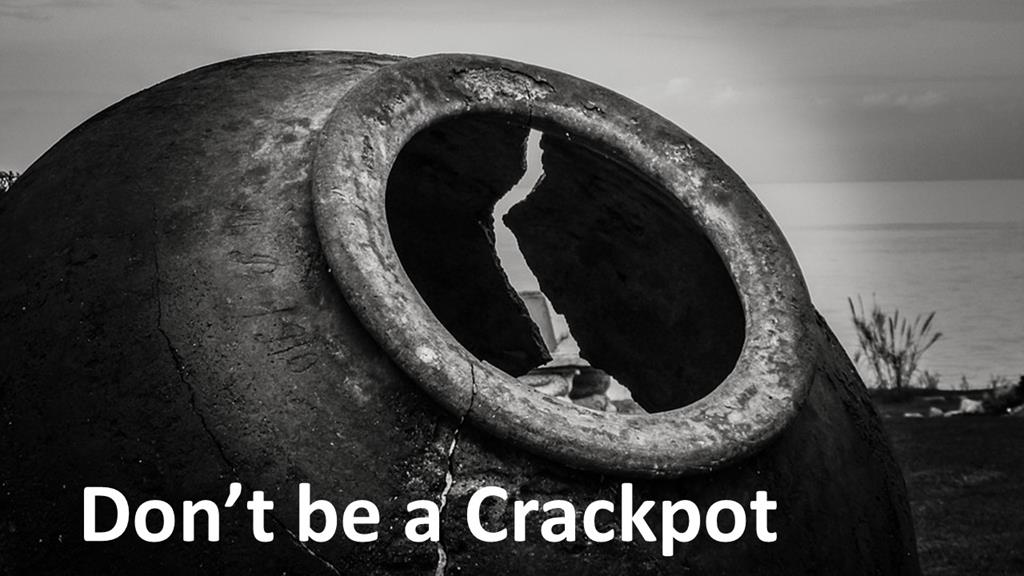
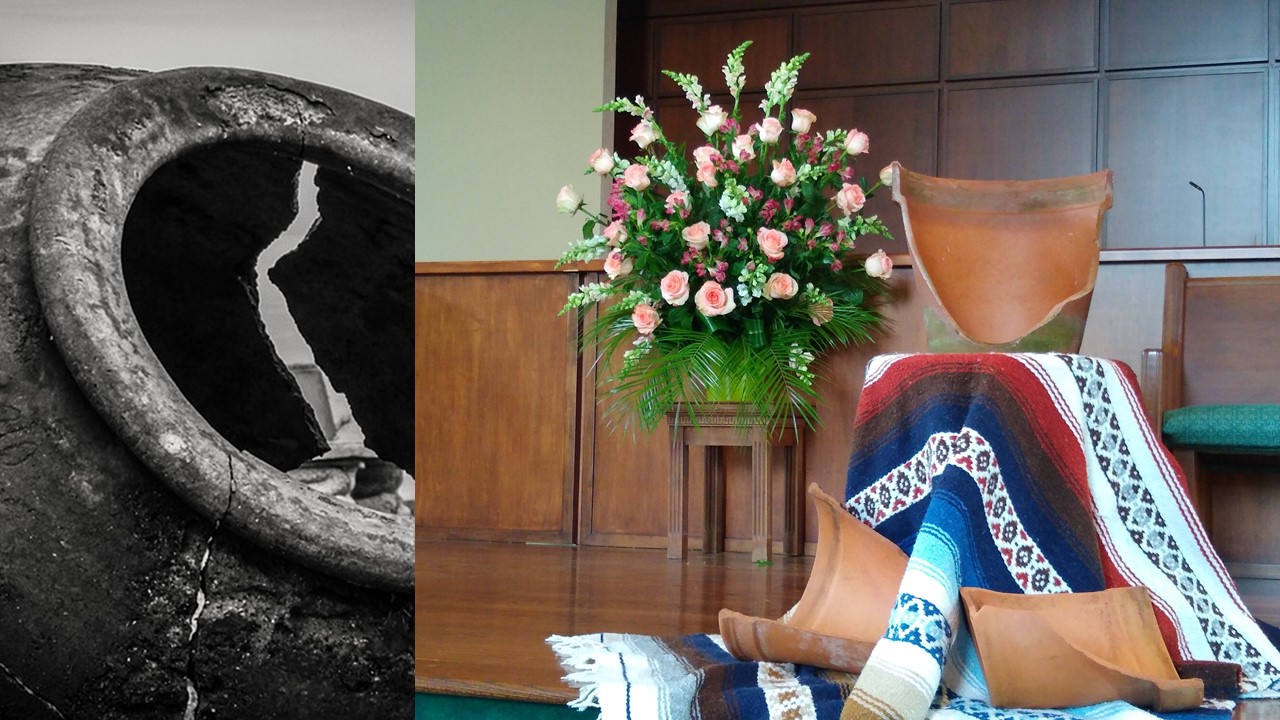
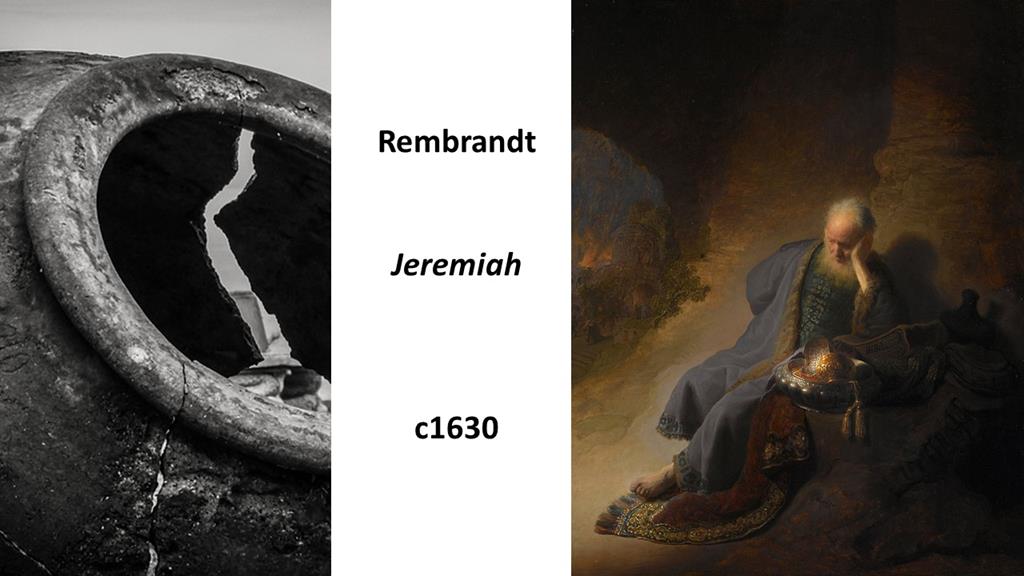 Last week we learned of Jeremiah’s call by God as a prophet to pluck up and to pull down, to destroy and to overthrow, to build and to plant.”
Last week we learned of Jeremiah’s call by God as a prophet to pluck up and to pull down, to destroy and to overthrow, to build and to plant.”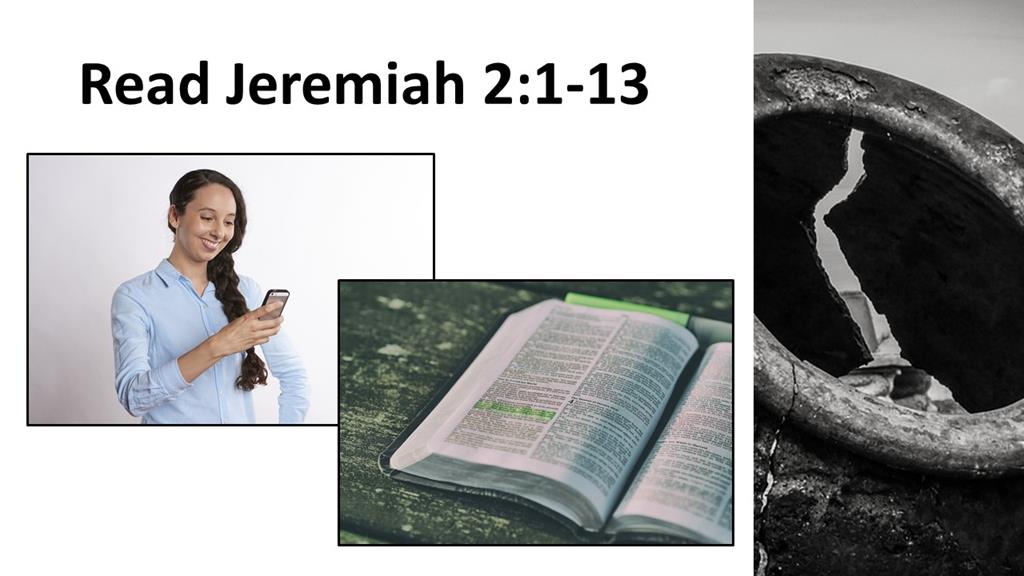
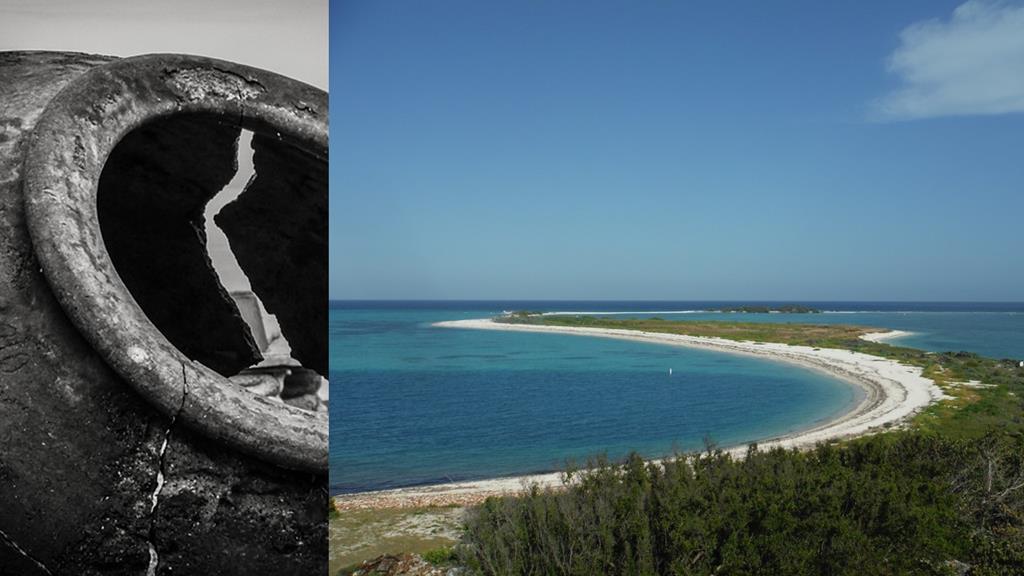 In the spring of 2018, my sister, my father, and I took a trip to the Dry Tortugas. I’m sure many of you read the article I had about the trip in The Skinnie.
In the spring of 2018, my sister, my father, and I took a trip to the Dry Tortugas. I’m sure many of you read the article I had about the trip in The Skinnie. If you’re going to have a fort with a substantial garrison on an island without fresh water, you must find a way to overcome that limitation. The engineers who designed Fort Jefferson came up with a unique way to address the lack of water. They built a series of cisterns under the walls of the fort and designed a system to funnel rainwater into the cisterns where they provided water for later use. The fort could hold nearly two million gallons of water. It was thought there would be enough water and provisions within the walls for the fort to survive a yearlong siege.
If you’re going to have a fort with a substantial garrison on an island without fresh water, you must find a way to overcome that limitation. The engineers who designed Fort Jefferson came up with a unique way to address the lack of water. They built a series of cisterns under the walls of the fort and designed a system to funnel rainwater into the cisterns where they provided water for later use. The fort could hold nearly two million gallons of water. It was thought there would be enough water and provisions within the walls for the fort to survive a yearlong siege.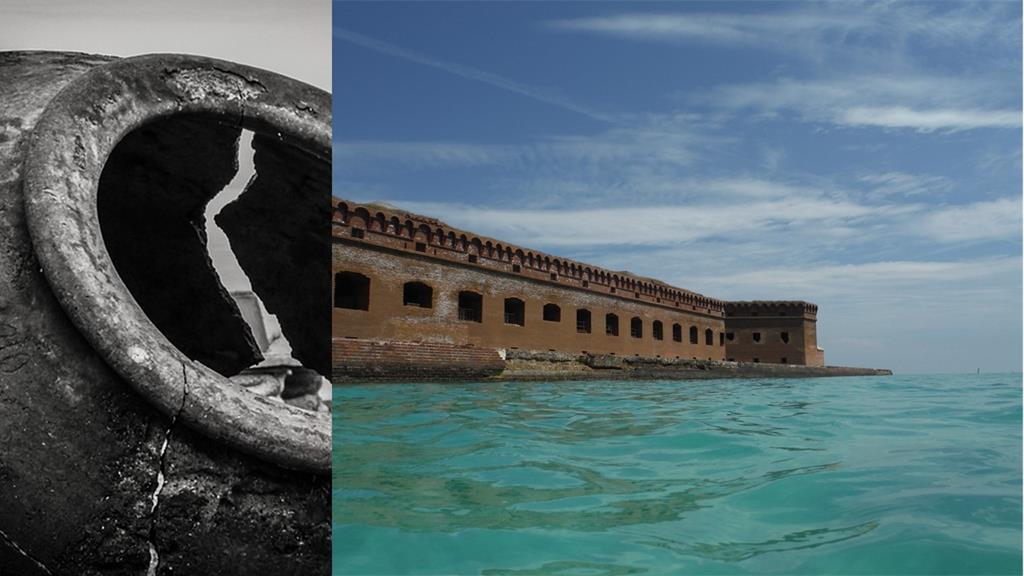 But the plans of men and women often fail. This massive fort, built with millions of bricks and packed dirt, was so heavy that of the 136 cisterns, all but three cracked and allowed saltwater to infiltrate. They became useless.
But the plans of men and women often fail. This massive fort, built with millions of bricks and packed dirt, was so heavy that of the 136 cisterns, all but three cracked and allowed saltwater to infiltrate. They became useless.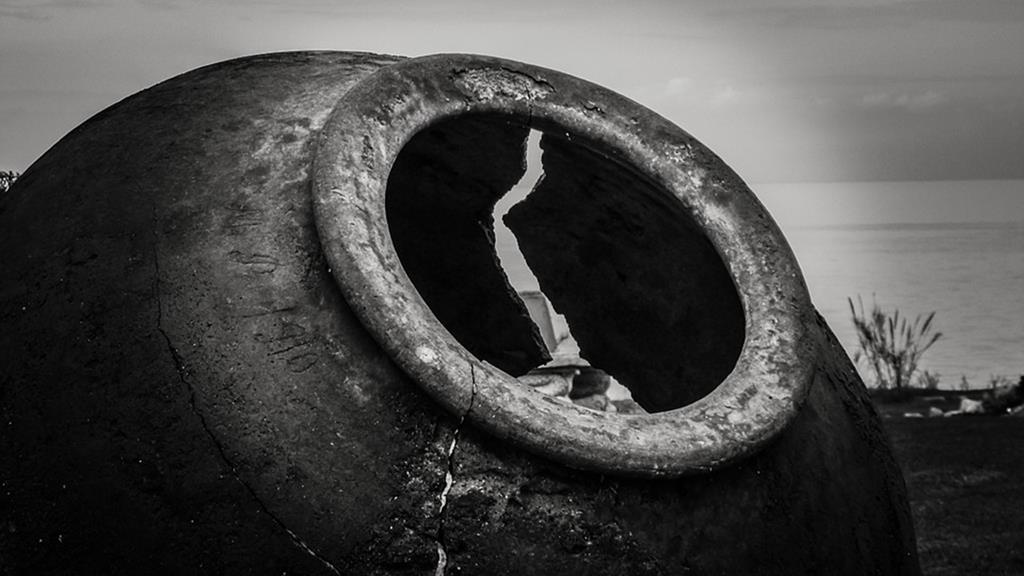 The cracked cistern image shows Israel’s condition after chasing after non-existent gods. As humans, we all need water. An image of God’s providence found throughout Scripture is that of living water nourishing us.
The cracked cistern image shows Israel’s condition after chasing after non-existent gods. As humans, we all need water. An image of God’s providence found throughout Scripture is that of living water nourishing us.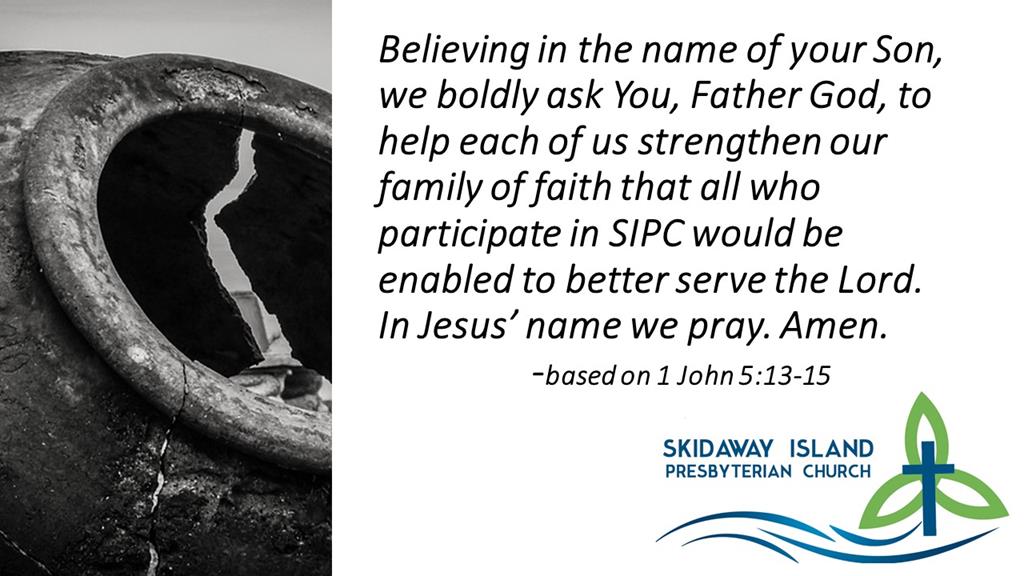
 Friends, we don’t want to be cracked pots. We want to be vessels holding abundant living water that will quench our thirst, and can be shared to others, to quench theirs. Amen.
Friends, we don’t want to be cracked pots. We want to be vessels holding abundant living water that will quench our thirst, and can be shared to others, to quench theirs. Amen.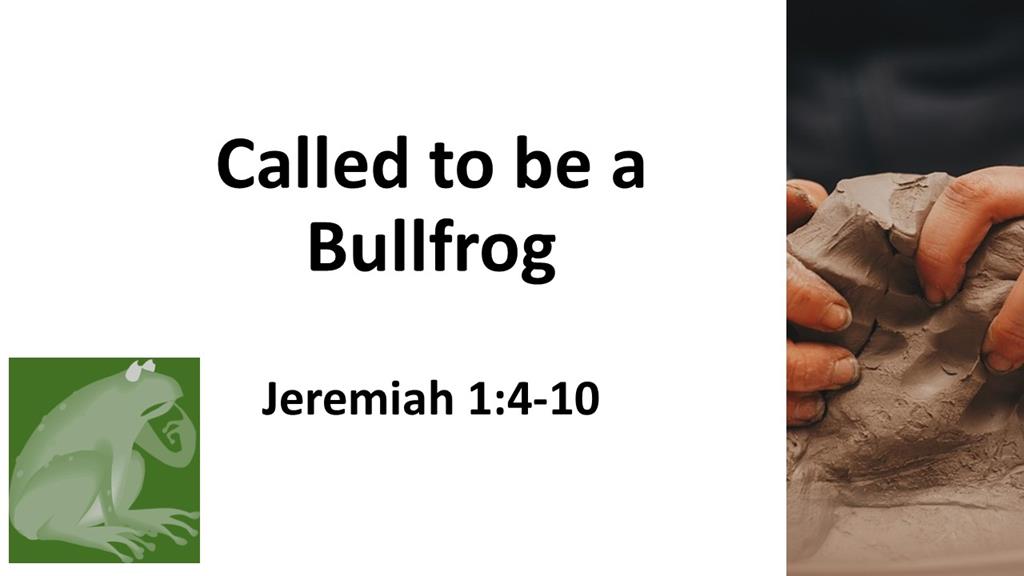 Jeff Garrison
Jeff Garrison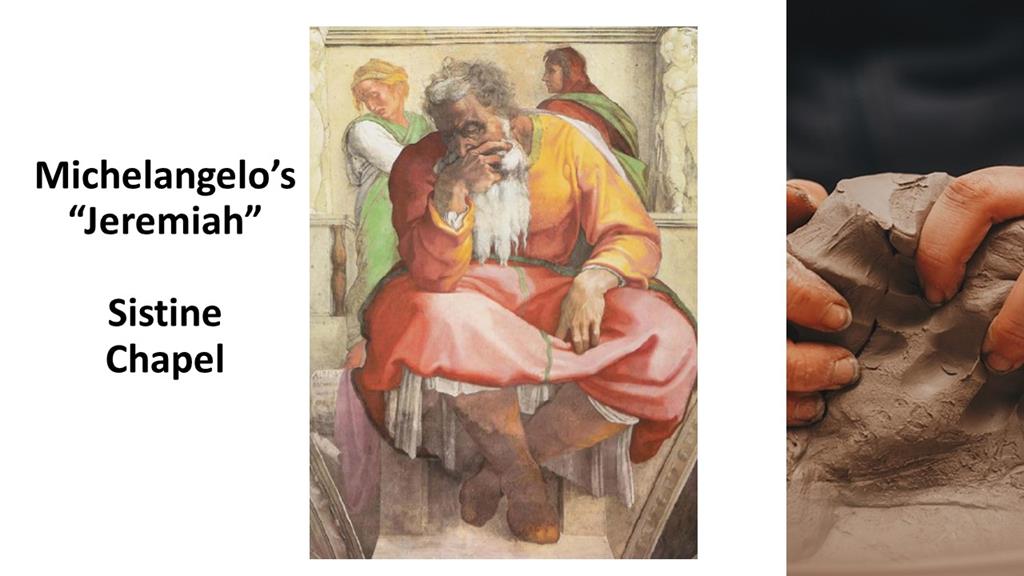 The prophet Jeremiah lived in interesting times. He was one of the longest serving prophets in Israel’s history, his calling coming as the Assyrians were losing power. It was a time of optimism in Jerusalem because they had existed as a vassal state under Assyria for over a century. It appeared they might be free once again, as in the years of Kings David and Solomon. Furthermore, Josiah, one of Judah’s few good kings, was implementing religious reforms. But then Josiah is killed in battle against Egypt.
The prophet Jeremiah lived in interesting times. He was one of the longest serving prophets in Israel’s history, his calling coming as the Assyrians were losing power. It was a time of optimism in Jerusalem because they had existed as a vassal state under Assyria for over a century. It appeared they might be free once again, as in the years of Kings David and Solomon. Furthermore, Josiah, one of Judah’s few good kings, was implementing religious reforms. But then Josiah is killed in battle against Egypt.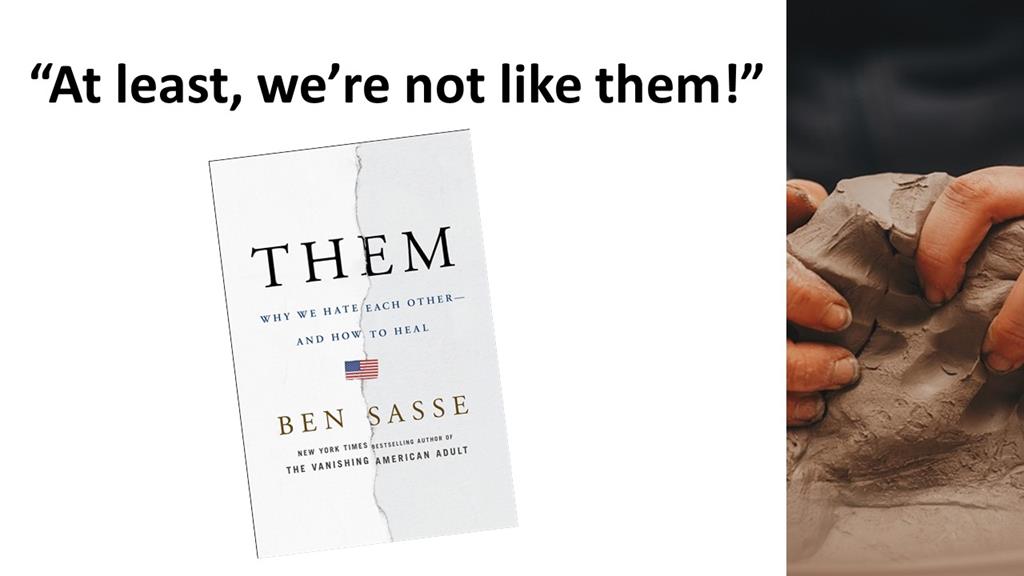 We, too, are living in interesting times. Things are scary in our world: rogue nations having the bomb, individuals going berserk and killing people, terrorists creating political instability, and huge storms leaving behind chaos and destruction. The news often leaves us fearful and angry. And since we often don’t have answers for the problems we face, we blame others. Ben Sasse, a Senator from Nebraska, suggests one of the few things uniting us is our contempt for those of whom we assign blame. “At least,” we say, “we’re not like them.”
We, too, are living in interesting times. Things are scary in our world: rogue nations having the bomb, individuals going berserk and killing people, terrorists creating political instability, and huge storms leaving behind chaos and destruction. The news often leaves us fearful and angry. And since we often don’t have answers for the problems we face, we blame others. Ben Sasse, a Senator from Nebraska, suggests one of the few things uniting us is our contempt for those of whom we assign blame. “At least,” we say, “we’re not like them.”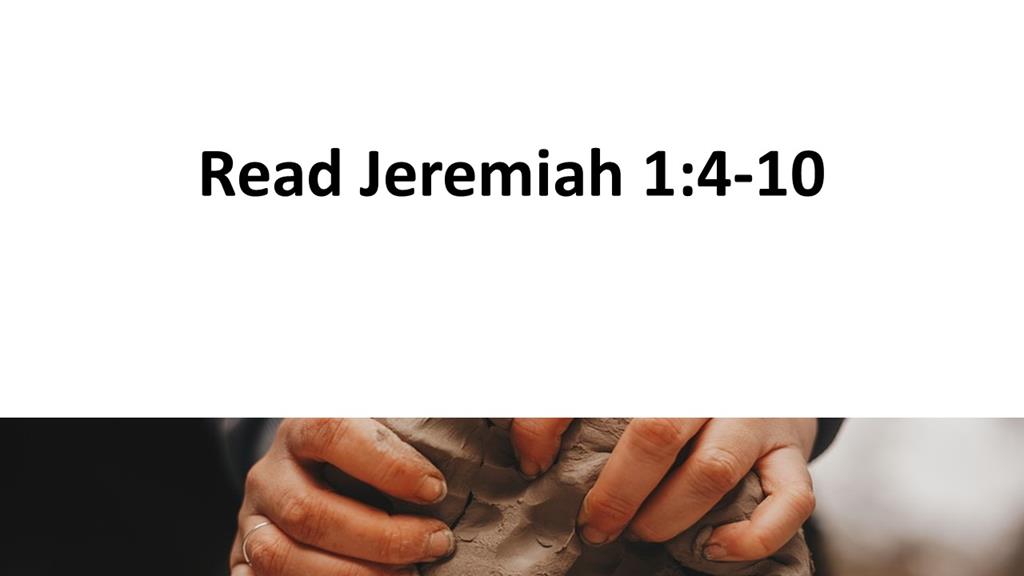
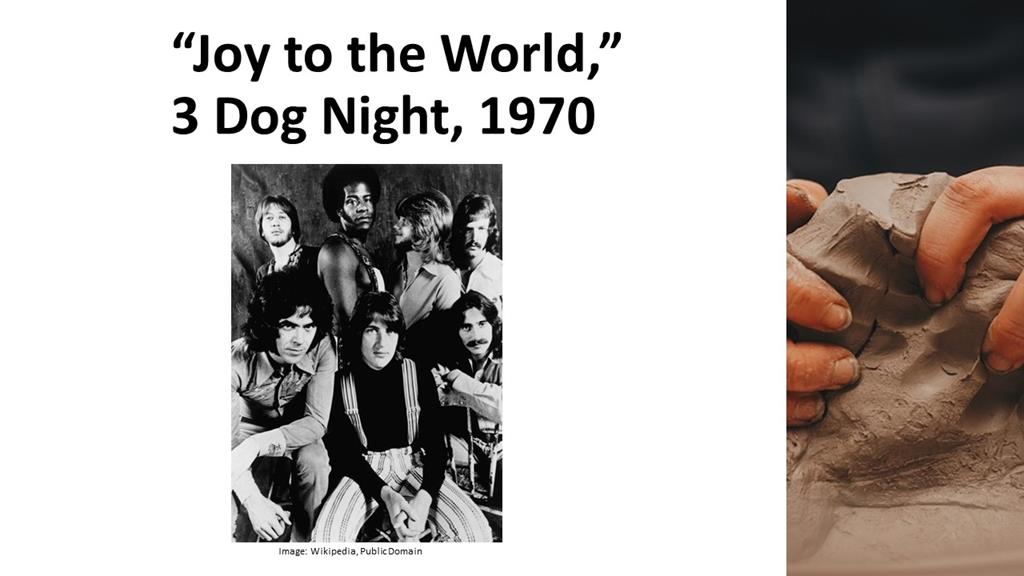 Jeremiah was a bullfrog,
Jeremiah was a bullfrog,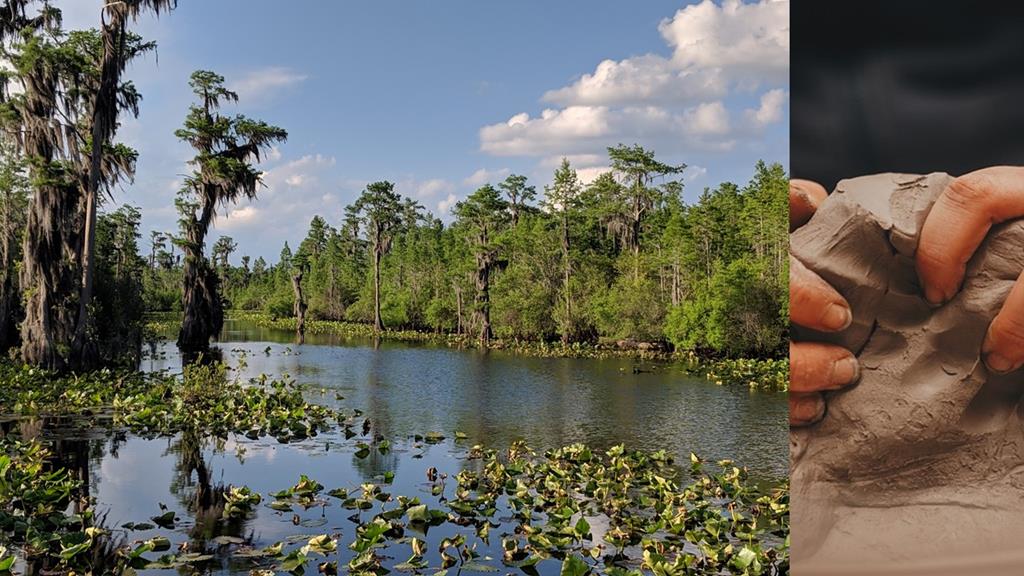 Back in early May, Gary Witbeck and I took a trip into the Okefenokee National Wildlife Refuge. On our second night, we were camping on a platform at a place called “Big Water.” It’s the headwaters for the Suwanee River. As the sun set and evening descended, we watched alligators battle over territory (or maybe they were fighting over mates, or were flirting, we couldn’t tell the difference). While the gators fought, in the background a chorus of frogs sang. Their song would come in waves, starting up the river and working its way down and then back up. The frogs were in perfect harmony. You couldn’t tell one frog’s croak from another. It was quite beautiful.
Back in early May, Gary Witbeck and I took a trip into the Okefenokee National Wildlife Refuge. On our second night, we were camping on a platform at a place called “Big Water.” It’s the headwaters for the Suwanee River. As the sun set and evening descended, we watched alligators battle over territory (or maybe they were fighting over mates, or were flirting, we couldn’t tell the difference). While the gators fought, in the background a chorus of frogs sang. Their song would come in waves, starting up the river and working its way down and then back up. The frogs were in perfect harmony. You couldn’t tell one frog’s croak from another. It was quite beautiful.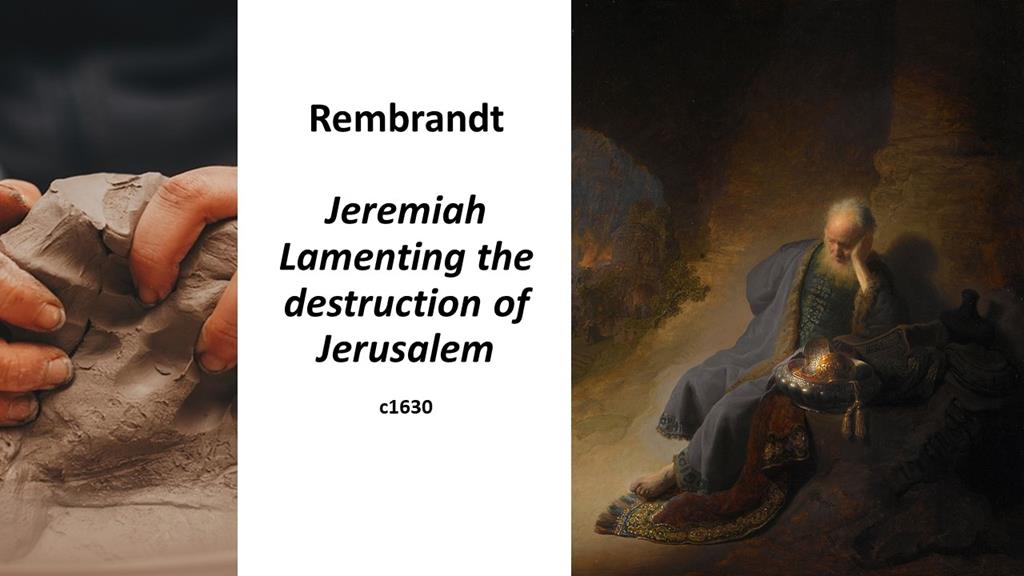 But this is where the song gets it wrong. The one singing, claims to be a friend of Jeremiah, enjoying drinking his wine. But the Jeremiah of the Old Testament, was often lonely. He didn’t have many friends bellying up to him at the bar. Like a bullfrog, he cried out the message from God that he’s been given, and message that no one wanted to hear, so he was often alone and vulnerable. But he was faithful, and when we consider eternity, that makes all the difference in the world.
But this is where the song gets it wrong. The one singing, claims to be a friend of Jeremiah, enjoying drinking his wine. But the Jeremiah of the Old Testament, was often lonely. He didn’t have many friends bellying up to him at the bar. Like a bullfrog, he cried out the message from God that he’s been given, and message that no one wanted to hear, so he was often alone and vulnerable. But he was faithful, and when we consider eternity, that makes all the difference in the world.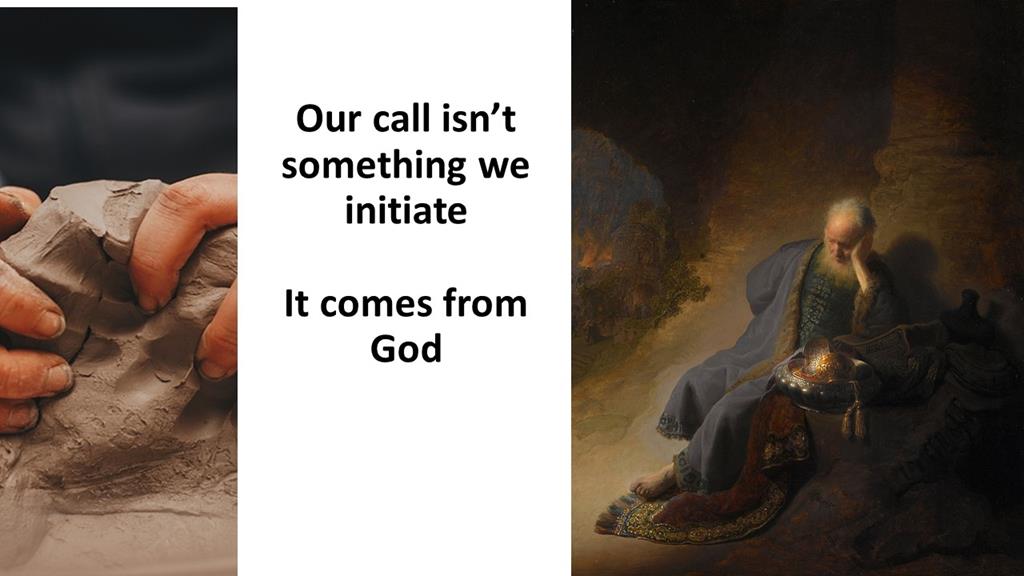 You’ll notice in the text that Jeremiah didn’t have a choice in all this. He was chosen by God before the foundation of the earth. Yesterday morning, in the Men’s Bible Study, we were reading Paul’s letter to the Ephesians, where are reminded that God calls us through Jesus Christ to do the work which has been prepared for us.
You’ll notice in the text that Jeremiah didn’t have a choice in all this. He was chosen by God before the foundation of the earth. Yesterday morning, in the Men’s Bible Study, we were reading Paul’s letter to the Ephesians, where are reminded that God calls us through Jesus Christ to do the work which has been prepared for us.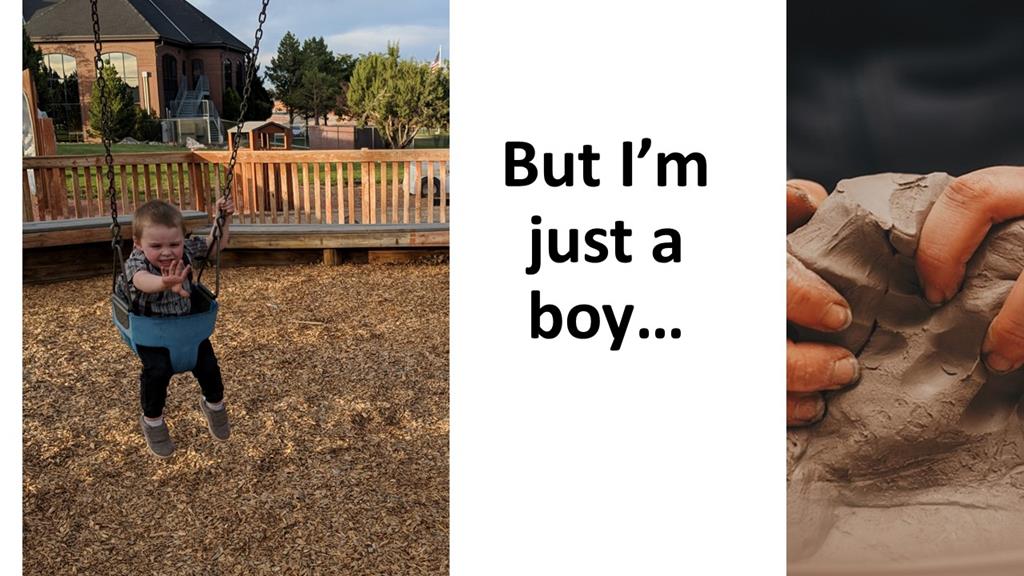 Of course, like Jeremiah, we can beg off. Jeremiah said, “I’m just a boy.” Looking around, we might say, “we’re too old.” But God has heard that one, too. Remember Abraham and Sara? How old were they?
Of course, like Jeremiah, we can beg off. Jeremiah said, “I’m just a boy.” Looking around, we might say, “we’re too old.” But God has heard that one, too. Remember Abraham and Sara? How old were they? Jeremiah has been appointed for a mission. Likewise, the church has been appointed for a mission. We’re all called by God to follow Jesus and to point to him as our hope in a world that often seems hopeless.
Jeremiah has been appointed for a mission. Likewise, the church has been appointed for a mission. We’re all called by God to follow Jesus and to point to him as our hope in a world that often seems hopeless. Over the next six weeks, as we work through this series, we’ll be using images of potters. Our image today is a clump of clay, being kneaded like bread dough. The technical term for doing this to clay is “wedged.” The potter takes the clay and stretches and pushes it like a baker works dough. In doing this, all the air pockets are worked out so that the clay is easier to shape on the wheel and afterwards, when firing, the pot won’t have air pockets that’ll explode and destroy the vessel.
Over the next six weeks, as we work through this series, we’ll be using images of potters. Our image today is a clump of clay, being kneaded like bread dough. The technical term for doing this to clay is “wedged.” The potter takes the clay and stretches and pushes it like a baker works dough. In doing this, all the air pockets are worked out so that the clay is easier to shape on the wheel and afterwards, when firing, the pot won’t have air pockets that’ll explode and destroy the vessel.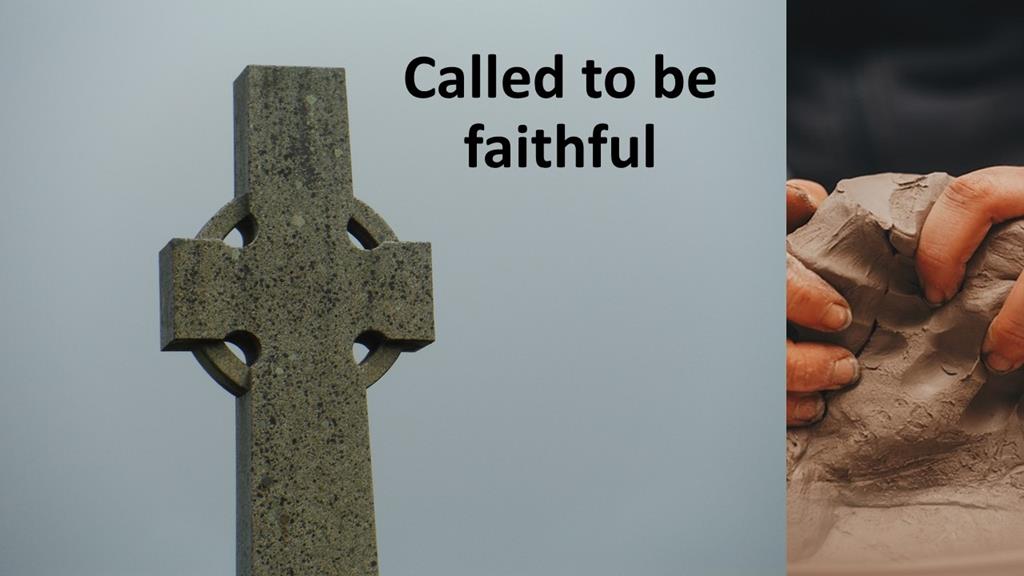 Paul, writing to the Ephesians, encouraged them to put away all bitterness, wrath, anger, wrangling, slander and malice. Such behavior is to be wedged out of us, like air is wedged out of the clay, so that we might be kind to one another, tenderhearted, and forgiving.
Paul, writing to the Ephesians, encouraged them to put away all bitterness, wrath, anger, wrangling, slander and malice. Such behavior is to be wedged out of us, like air is wedged out of the clay, so that we might be kind to one another, tenderhearted, and forgiving.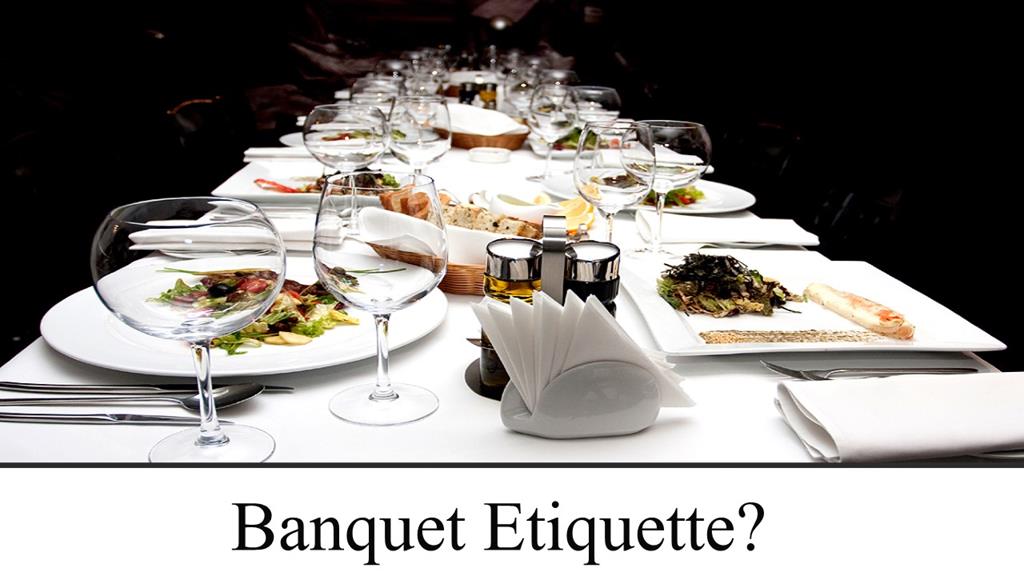
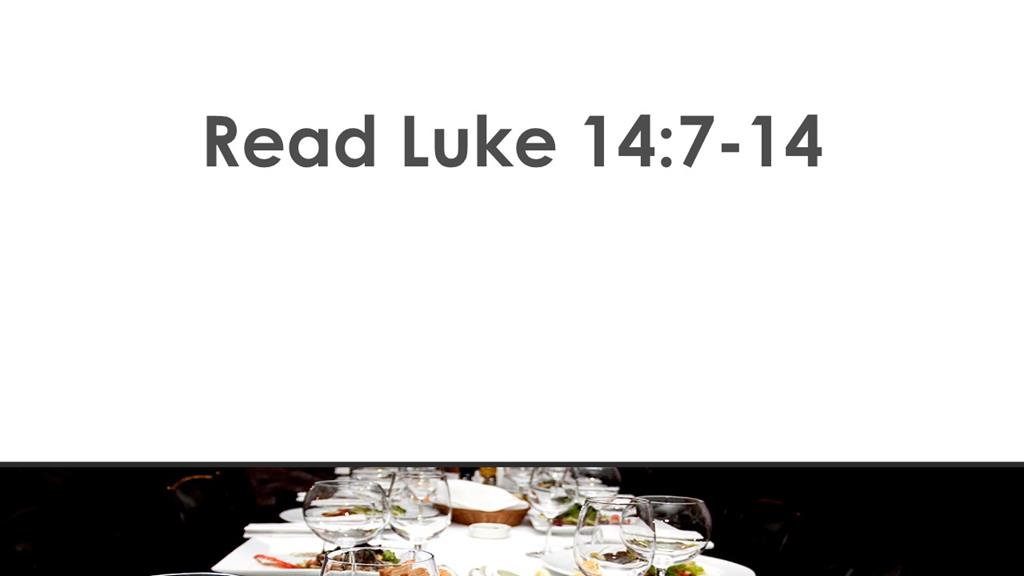
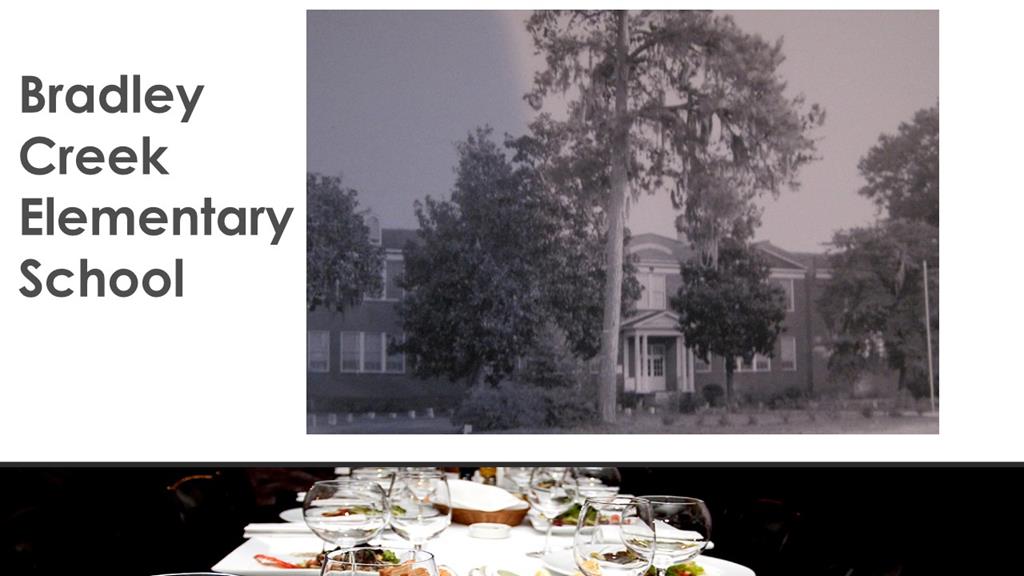 At the end of the sixth grade at Bradley Creek Elementary School, there was a graduation banquet. It was held in the evening, which made it special, and in the cafeteria, which wasn’t so special. I’m sure we had macaroni and cheese. We always had mac and cheese. There must have been a rule that you couldn’t open the cafeteria without mac and cheese. But this was a special meal, so maybe there was a slice of ham or a piece of chicken and a piece of cake that was larger than the one inch cubes they fed us at lunch.
At the end of the sixth grade at Bradley Creek Elementary School, there was a graduation banquet. It was held in the evening, which made it special, and in the cafeteria, which wasn’t so special. I’m sure we had macaroni and cheese. We always had mac and cheese. There must have been a rule that you couldn’t open the cafeteria without mac and cheese. But this was a special meal, so maybe there was a slice of ham or a piece of chicken and a piece of cake that was larger than the one inch cubes they fed us at lunch.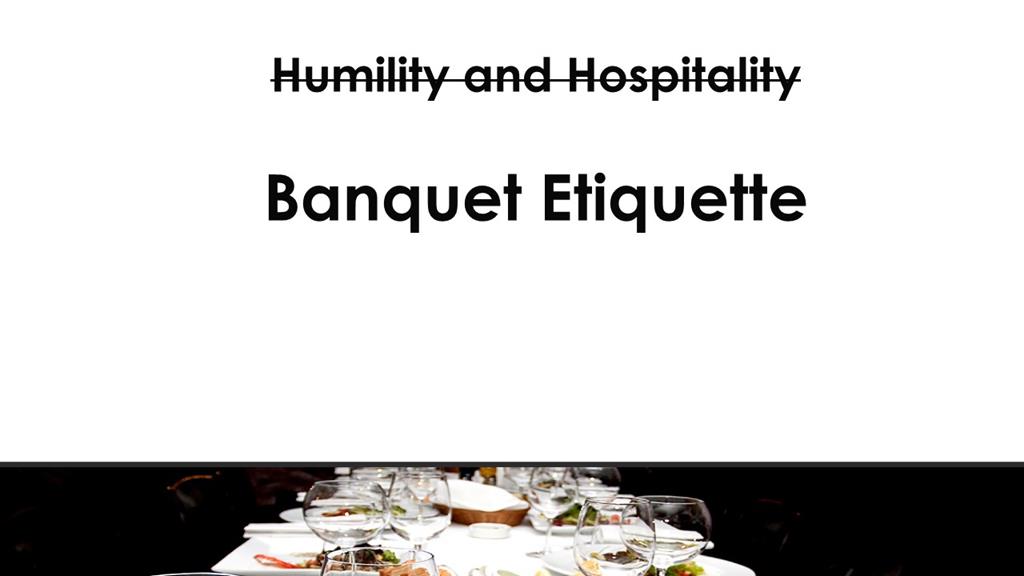 In the bulletin, I titled this sermon “Humility and Hospitality.” The problem with coming up with a title a few weeks before writing a sermon is that you often have no idea where the sermon is heading. I later decided that a better title might be Banquet Etiquette. But as I continued to study and ponder, I decided to put a question mark at the end. Yes, Jesus expects us to be humble and not pretentious. Such advice will also keep us from being in an embarrassing position. Yes, on the surface, this is about etiquette. But is this what Jesus is driving? Is this Jesus’ attempt to be the Emily Post of the first century? Or is there a deeper message here?
In the bulletin, I titled this sermon “Humility and Hospitality.” The problem with coming up with a title a few weeks before writing a sermon is that you often have no idea where the sermon is heading. I later decided that a better title might be Banquet Etiquette. But as I continued to study and ponder, I decided to put a question mark at the end. Yes, Jesus expects us to be humble and not pretentious. Such advice will also keep us from being in an embarrassing position. Yes, on the surface, this is about etiquette. But is this what Jesus is driving? Is this Jesus’ attempt to be the Emily Post of the first century? Or is there a deeper message here?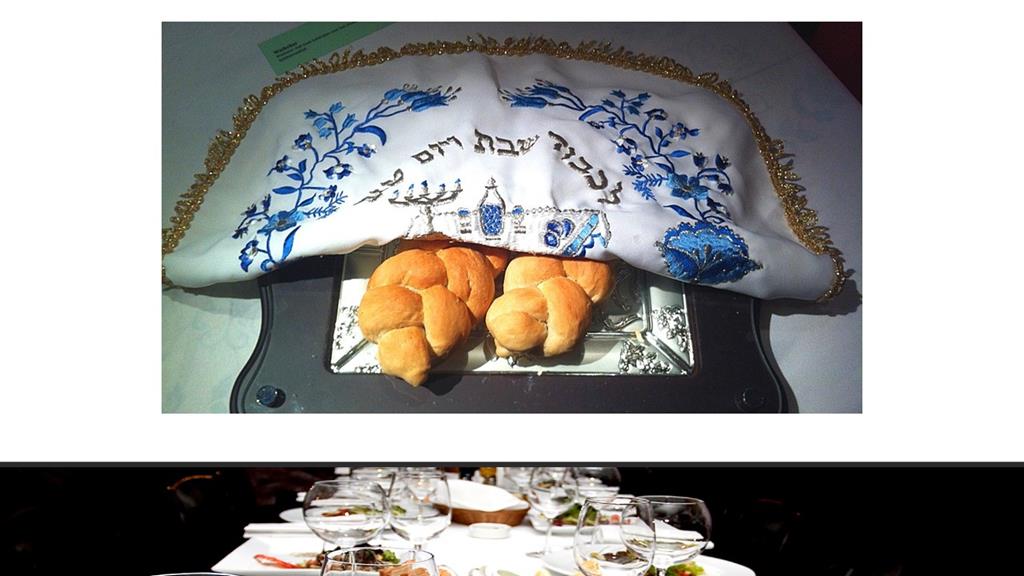 Remember what I said about the Sabbath, before reading this passage? That it was a foretaste of the eternal kingdom. And this section of Luke’s gospel is filled with parables that focus on the kingdom.
Remember what I said about the Sabbath, before reading this passage? That it was a foretaste of the eternal kingdom. And this section of Luke’s gospel is filled with parables that focus on the kingdom.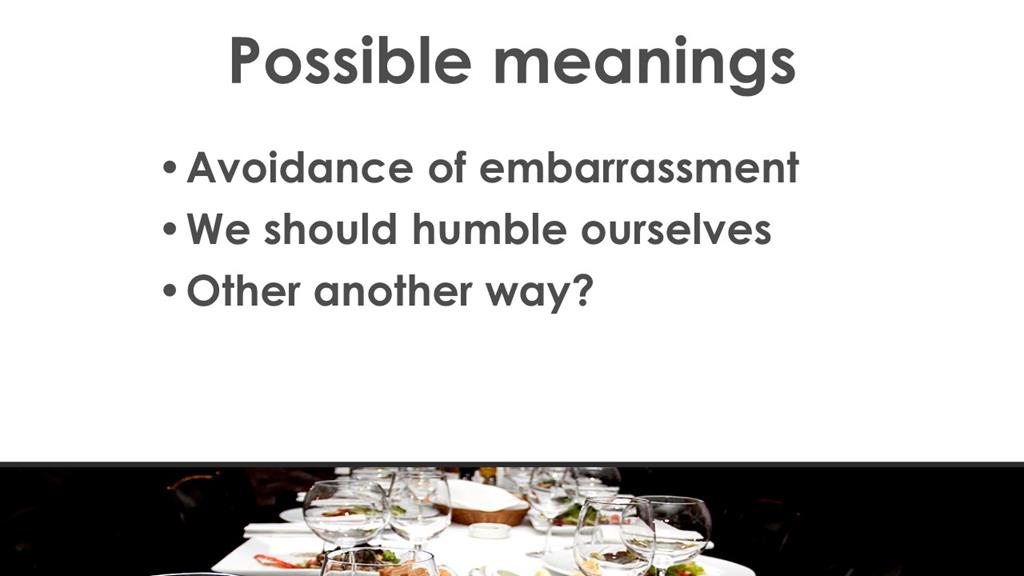 The surface meaning may have to do with avoiding embarrassment. A deeper meaning might be that we should humble ourselves. One of the challenges that Jesus had was his disciples wanting to grab key positions in the coming kingdom.
The surface meaning may have to do with avoiding embarrassment. A deeper meaning might be that we should humble ourselves. One of the challenges that Jesus had was his disciples wanting to grab key positions in the coming kingdom.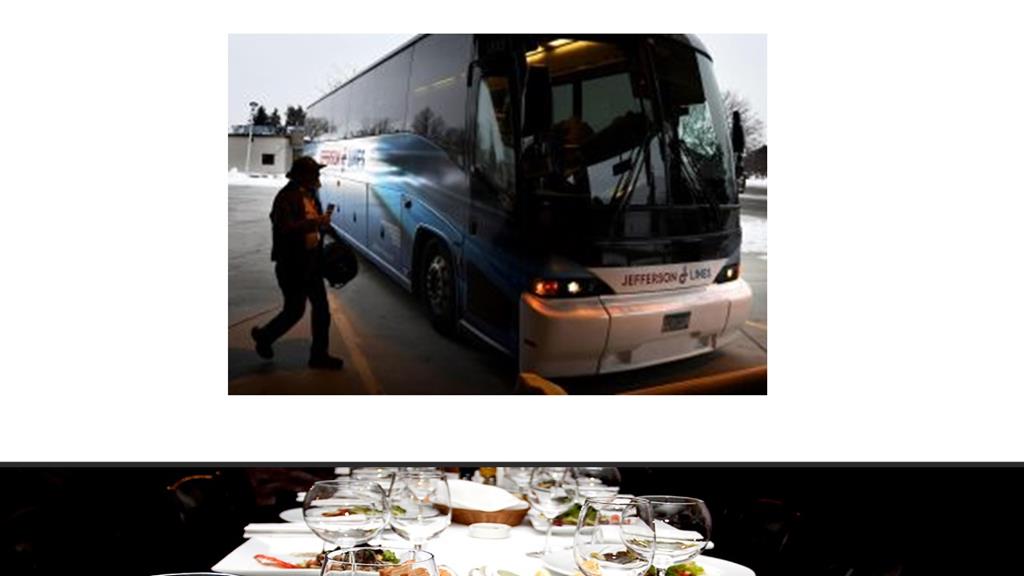 But there is another way to look at this parable, which I had not considered until I read a blog post by a pastor in Iowa earlier this week.
But there is another way to look at this parable, which I had not considered until I read a blog post by a pastor in Iowa earlier this week.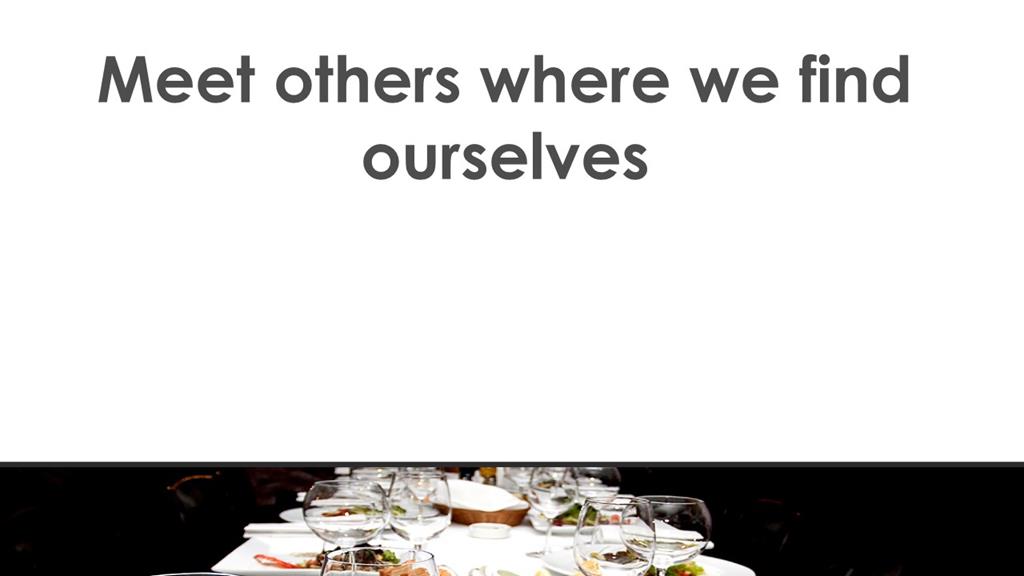 Instead of Jesus wanting us to show humility in the hopes that we might be called up to the head table (as you could read this passage), maybe Jesus is telling us to meet others where we find ourselves. Show hospitality to those less fortunate. If our only goal was to sit at the head table, we could easily display false humility to gain such a blessing.
Instead of Jesus wanting us to show humility in the hopes that we might be called up to the head table (as you could read this passage), maybe Jesus is telling us to meet others where we find ourselves. Show hospitality to those less fortunate. If our only goal was to sit at the head table, we could easily display false humility to gain such a blessing. 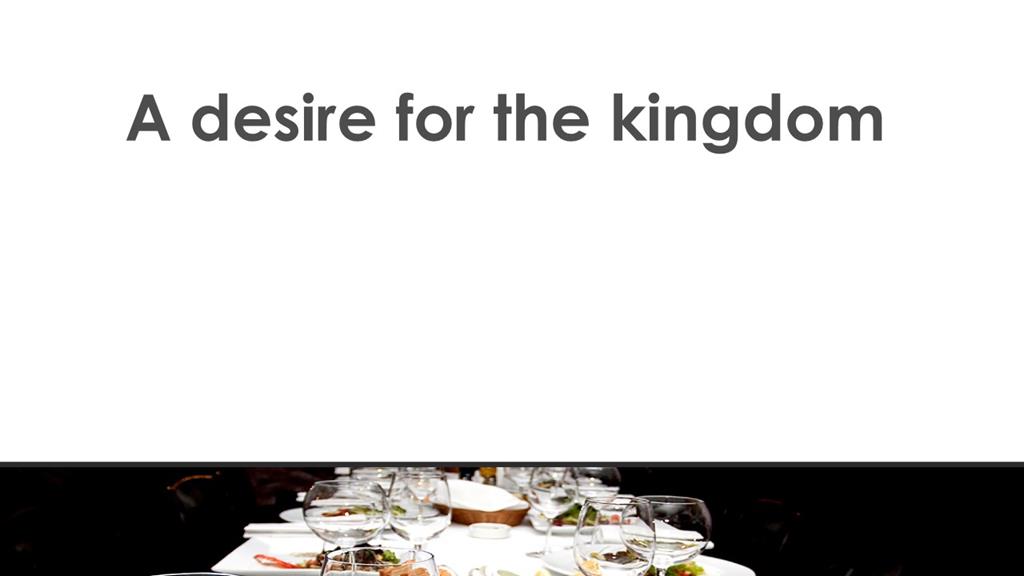 But Jesus wants us to long for the kingdom, which isn’t going to be made up of exclusively of those who look, and act like us. Jesus’ vision is for a world where believers cherish their friendship and fellowship with all people. It’s about us showing goodness to those who have no way to repay us for what we can do for them. Ponder what this kind of world might look like.
But Jesus wants us to long for the kingdom, which isn’t going to be made up of exclusively of those who look, and act like us. Jesus’ vision is for a world where believers cherish their friendship and fellowship with all people. It’s about us showing goodness to those who have no way to repay us for what we can do for them. Ponder what this kind of world might look like. You know, none of us know what this week will bring as Dorian churns up the waters. When Hurricane Matthew hit in 2016, I spent a few days in Dublin, GA. There’s a great hot dog shop there, not far from the courthouse, where I found myself drawn at lunchtime. There were the regulars, but there was also those of us in exile: from Savannah, from Hilton Head, from Brunswick and Saint Simons. The place was packed. Friendships were made as we were forced to share tables. Stories were told of shared experiences such as being in gridlock on the highway. There was a lot laughter. I image that’s how the kingdom will be. So, if we evacuate this week, and you find yourself in a strange land for a few days, don’t see it as a burden. Instead, take it as an opportunity to sample the kingdom. That’s what Jesus would have you do. Let us pray:
You know, none of us know what this week will bring as Dorian churns up the waters. When Hurricane Matthew hit in 2016, I spent a few days in Dublin, GA. There’s a great hot dog shop there, not far from the courthouse, where I found myself drawn at lunchtime. There were the regulars, but there was also those of us in exile: from Savannah, from Hilton Head, from Brunswick and Saint Simons. The place was packed. Friendships were made as we were forced to share tables. Stories were told of shared experiences such as being in gridlock on the highway. There was a lot laughter. I image that’s how the kingdom will be. So, if we evacuate this week, and you find yourself in a strange land for a few days, don’t see it as a burden. Instead, take it as an opportunity to sample the kingdom. That’s what Jesus would have you do. Let us pray:
 Why do we exist? What is our purpose in life? The Westminster Confession says we’re to enjoy and glorify God. That’s succinct. In Rick Warren’s best seller, The Purpose Driven Life, he expands this into five purposes. First, we are to love God. God wants us to open our lives up so that we might experience and be overwhelmed by divine love and in turn we might show our love to God. We call this worship. Our second purpose is that we’re created to belong to God’s family, which we know as the church. Within this new family, we are to be nurtured and to mature. This morning, I want us to consider our third purpose: to become like God’s Son. A big word for this is sanctification. We’re to become Christ-like. The fourth and fifth purposes are that we’re shaped to serve God and are made for a God-given mission.
Why do we exist? What is our purpose in life? The Westminster Confession says we’re to enjoy and glorify God. That’s succinct. In Rick Warren’s best seller, The Purpose Driven Life, he expands this into five purposes. First, we are to love God. God wants us to open our lives up so that we might experience and be overwhelmed by divine love and in turn we might show our love to God. We call this worship. Our second purpose is that we’re created to belong to God’s family, which we know as the church. Within this new family, we are to be nurtured and to mature. This morning, I want us to consider our third purpose: to become like God’s Son. A big word for this is sanctification. We’re to become Christ-like. The fourth and fifth purposes are that we’re shaped to serve God and are made for a God-given mission.
 Last weekend, Donna and I were in Cumberland Gap, a significant place in American history even through it is mostly overlooked these days. This gap was the easiest place for settlers from the Carolinas to Southern Pennsylvania to make their way across the Appalachian Mountains. Today, we breeze through those mountains on engineered roads, but in the late 18th Century, those mountains stood like barricades, keeping people out. Then along came Daniel Boone, who built the Wilderness Road through the mountains and for the next hundred years, it was the easiest way to get into Kentucky and Tennessee and further west. It felt good to be there, riding bikes over the same terrain that Boone cut the road that began western migration. I’ve always liked Daniel Boone.
Last weekend, Donna and I were in Cumberland Gap, a significant place in American history even through it is mostly overlooked these days. This gap was the easiest place for settlers from the Carolinas to Southern Pennsylvania to make their way across the Appalachian Mountains. Today, we breeze through those mountains on engineered roads, but in the late 18th Century, those mountains stood like barricades, keeping people out. Then along came Daniel Boone, who built the Wilderness Road through the mountains and for the next hundred years, it was the easiest way to get into Kentucky and Tennessee and further west. It felt good to be there, riding bikes over the same terrain that Boone cut the road that began western migration. I’ve always liked Daniel Boone. My first lunch box had a photo of Fess Parker who played Daniel Boone in the TV show that was popular back during my childhood years. And you bet I watched it. When I was in the second grade, we had an opportunity to buy books from a flyer sent home from the school. It was fundraiser designed to raise money for the school and help get books into the hands of children. My parents allowed me to buy a book. I looked through that catalog and knew right away that the book I wanted. It was a biography, written on a child’s level, of Daniel Boone. On the day that it came, I looked through the book, but found many words I did not know so I took it to my mom, and she helped me read. One of the words that I seemed to have a hard time learning was “enemy.” I just couldn’t get it out. I had a mental block against this word and had to ask several times what the word was. Hard to imagine ever being that innocent, isn’t it?
My first lunch box had a photo of Fess Parker who played Daniel Boone in the TV show that was popular back during my childhood years. And you bet I watched it. When I was in the second grade, we had an opportunity to buy books from a flyer sent home from the school. It was fundraiser designed to raise money for the school and help get books into the hands of children. My parents allowed me to buy a book. I looked through that catalog and knew right away that the book I wanted. It was a biography, written on a child’s level, of Daniel Boone. On the day that it came, I looked through the book, but found many words I did not know so I took it to my mom, and she helped me read. One of the words that I seemed to have a hard time learning was “enemy.” I just couldn’t get it out. I had a mental block against this word and had to ask several times what the word was. Hard to imagine ever being that innocent, isn’t it?


 How might we become more Christ-like? As I’ve already covered, the writer of Hebrews first suggests we strive to unburden ourselves of sin. As a runner, anything that holds us back can be a burden; so we should make sure we are not overwhelmed. We free ourselves of burdens so that we might run faster. Secondly, we’re to persevere. We are not perfect: there will be times we’ll trip, there will be times we fall, but like a good athlete, we brush ourselves off and continue. We must pace ourselves for it’s a life-long race. We don’t give up for we are after the prize. When our time here is up, we want to stand boldly before God’s throne.
How might we become more Christ-like? As I’ve already covered, the writer of Hebrews first suggests we strive to unburden ourselves of sin. As a runner, anything that holds us back can be a burden; so we should make sure we are not overwhelmed. We free ourselves of burdens so that we might run faster. Secondly, we’re to persevere. We are not perfect: there will be times we’ll trip, there will be times we fall, but like a good athlete, we brush ourselves off and continue. We must pace ourselves for it’s a life-long race. We don’t give up for we are after the prize. When our time here is up, we want to stand boldly before God’s throne.

 Jeff Garrison
Jeff Garrison


 But how many of us truly live life without worry? I fall short of the mark. I worry about a lot of things, just like you. We worry about our loved ones, our jobs, our retirement portfolios, our safety, our health, the health of our animals (that’s a big one for most of us don’t have them insured). The list goes on and on. We worry about the economy and the violence that seems too prevalent in our society. We worry about international politics, climate change, and sea level rise. As people, we worry. But the phrase often heard throughout scripture, whenever God or a representative of God is present, is “do not be afraid.”
But how many of us truly live life without worry? I fall short of the mark. I worry about a lot of things, just like you. We worry about our loved ones, our jobs, our retirement portfolios, our safety, our health, the health of our animals (that’s a big one for most of us don’t have them insured). The list goes on and on. We worry about the economy and the violence that seems too prevalent in our society. We worry about international politics, climate change, and sea level rise. As people, we worry. But the phrase often heard throughout scripture, whenever God or a representative of God is present, is “do not be afraid.” As I said, our passage starts out with a wonderful promise from God about how God wants to give us good things, then it’s followed with two stories about the end of time. Our first story is based on a wedding banquet. The slaves await their master’s return so they can open the door for him and welcome him home. This is a positive parable, for those who aren’t dozing find themselves recipients of the master’s hospitality. He’s in a jolly mood after the wedding, so even though he returns in the middle of the night, the master pulls up his gown and ties it off around his waist, like a servant who needs to have freedom of movement to do his tasks. Then he has his slaves sit down and serves them dinner. This is odd behavior. The master, in the middle of the night, assuming the role of a slave in order to serve his servants. Who has ever heard of such a thing? This story, instead of encouraging us to be afraid of the Second Coming, should make us look forward to it. God wants to reward us by serving us. In scripture, the heavenly banquet is often used as a metaphor for the here-after. If we are doing God’s work when he returns (or when he calls us home), we’re promised good things.
As I said, our passage starts out with a wonderful promise from God about how God wants to give us good things, then it’s followed with two stories about the end of time. Our first story is based on a wedding banquet. The slaves await their master’s return so they can open the door for him and welcome him home. This is a positive parable, for those who aren’t dozing find themselves recipients of the master’s hospitality. He’s in a jolly mood after the wedding, so even though he returns in the middle of the night, the master pulls up his gown and ties it off around his waist, like a servant who needs to have freedom of movement to do his tasks. Then he has his slaves sit down and serves them dinner. This is odd behavior. The master, in the middle of the night, assuming the role of a slave in order to serve his servants. Who has ever heard of such a thing? This story, instead of encouraging us to be afraid of the Second Coming, should make us look forward to it. God wants to reward us by serving us. In scripture, the heavenly banquet is often used as a metaphor for the here-after. If we are doing God’s work when he returns (or when he calls us home), we’re promised good things. The second parable is about a thief coming in the night. This parable is a bit more of a threat, for we are reminded of the uncertainty of when things will happen. Jesus reminds us that if the owner of a house knew when a thief was coming, he or she would remain awake. We’d probably be sitting in a chair, with a good view of the door, with a shotgun across our lap, ready to properly greet the intruder. But since we don’t know when a thief will pay us a visit, we must take precautions. We lock the doors. We latch the windows. We safely store valuables and pay insurance premiums.
The second parable is about a thief coming in the night. This parable is a bit more of a threat, for we are reminded of the uncertainty of when things will happen. Jesus reminds us that if the owner of a house knew when a thief was coming, he or she would remain awake. We’d probably be sitting in a chair, with a good view of the door, with a shotgun across our lap, ready to properly greet the intruder. But since we don’t know when a thief will pay us a visit, we must take precautions. We lock the doors. We latch the windows. We safely store valuables and pay insurance premiums. These two parables complement each other. In one, we’re told to be awake, to be alert, for the Lord is coming. In other words, we’re told to be busy, doing God’s work. The second parable reminds us that we need to prepare ourselves for we don’t know when our Lord will return.
These two parables complement each other. In one, we’re told to be awake, to be alert, for the Lord is coming. In other words, we’re told to be busy, doing God’s work. The second parable reminds us that we need to prepare ourselves for we don’t know when our Lord will return. Okay, you’re thinking. The church has been expectantly waiting for two millennia and Christ hasn’t yet appeared in glory. But I believe he will. Preparing for his coming is paramount. Furthermore, it doesn’t matter if we’ll be the one to see Christ come in the clouds or if we meet him on our deathbed or when we accidently step in front of a dump truck, the time will come that it will be too late. Preparation for our earthly demise is necessary. We’re to make our peace with God so we’ll be justified before the throne on the Day of Judgment. Furthermore, we’re then to use our talents to further God’s glory in the world as we strive to be more Christ-like.
Okay, you’re thinking. The church has been expectantly waiting for two millennia and Christ hasn’t yet appeared in glory. But I believe he will. Preparing for his coming is paramount. Furthermore, it doesn’t matter if we’ll be the one to see Christ come in the clouds or if we meet him on our deathbed or when we accidently step in front of a dump truck, the time will come that it will be too late. Preparation for our earthly demise is necessary. We’re to make our peace with God so we’ll be justified before the throne on the Day of Judgment. Furthermore, we’re then to use our talents to further God’s glory in the world as we strive to be more Christ-like. What should we take from this passage and apply to our lives today? Sure, we’re reminded, as the cliché goes, to get our ducks in order. We need to make peace with God while there is still time—before the master returns. But we also need to see there is no need to fear the second coming. The coming isn’t seen as a fearful event, but one of excited expectation, of God’s blessings!
What should we take from this passage and apply to our lives today? Sure, we’re reminded, as the cliché goes, to get our ducks in order. We need to make peace with God while there is still time—before the master returns. But we also need to see there is no need to fear the second coming. The coming isn’t seen as a fearful event, but one of excited expectation, of God’s blessings! The first parable reminds us that we need to be ready to use what God has given us, our talents, to further the master’s work in the world. We’ve all been given talents and skills that we can use to build up the body of Christ, just as we all had different talents yesterday on the job site. Are we ready? Do we put our skills and abilities to use? Or do we sit back with the hope someone else does our part? If we chose the latter, we’re no different than the servants who played around and were not ready for the master’s return. But if we’re doing our part, then we’re promised that when Christ calls us home, we’ll find a place set for us at the table.
The first parable reminds us that we need to be ready to use what God has given us, our talents, to further the master’s work in the world. We’ve all been given talents and skills that we can use to build up the body of Christ, just as we all had different talents yesterday on the job site. Are we ready? Do we put our skills and abilities to use? Or do we sit back with the hope someone else does our part? If we chose the latter, we’re no different than the servants who played around and were not ready for the master’s return. But if we’re doing our part, then we’re promised that when Christ calls us home, we’ll find a place set for us at the table.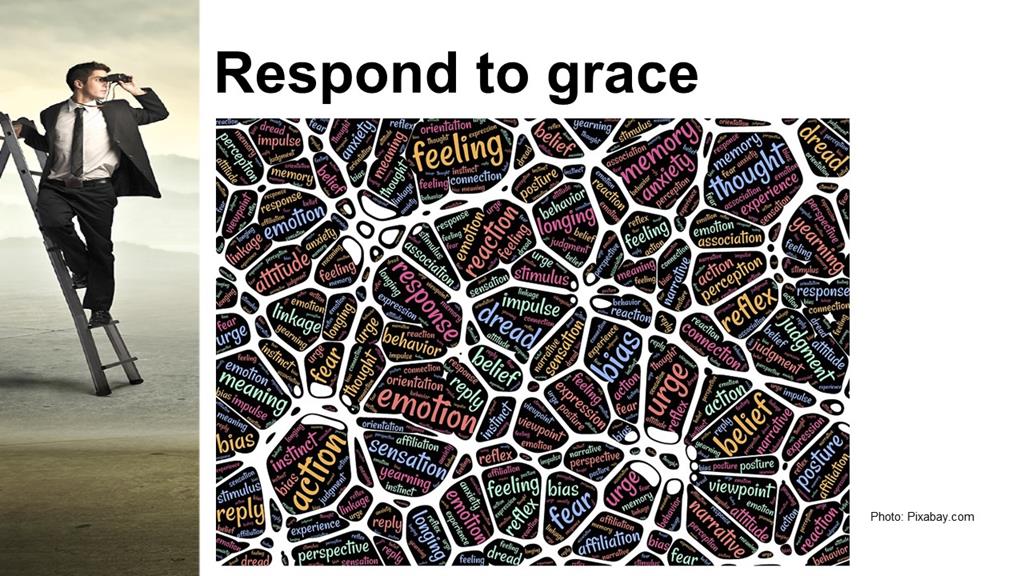 Even though these passages encourage us to be alert and active, we need to keep in mind as we do the work of a disciple, we are not buying ourselves into heaven nor are we striving to get a better room in the sweet bye-an-bye. We are called, as Christians, to respond to God’s grace, not to earn it. And we respond to God’s grace by creating a life that honors God and furthers the kingdom’s work in the world. Jesus, our Lord, died for us. He was the obedient servant. Through his sacrifice, our sins are forgiven, and we are freed to go out and work on the behalf of others that they too might come to experience his love. The Christian life is about forgiveness and service. It’s also not worrying about tomorrow, trusting in God’s providence and longing to experience the joy of being in God’s presence.
Even though these passages encourage us to be alert and active, we need to keep in mind as we do the work of a disciple, we are not buying ourselves into heaven nor are we striving to get a better room in the sweet bye-an-bye. We are called, as Christians, to respond to God’s grace, not to earn it. And we respond to God’s grace by creating a life that honors God and furthers the kingdom’s work in the world. Jesus, our Lord, died for us. He was the obedient servant. Through his sacrifice, our sins are forgiven, and we are freed to go out and work on the behalf of others that they too might come to experience his love. The Christian life is about forgiveness and service. It’s also not worrying about tomorrow, trusting in God’s providence and longing to experience the joy of being in God’s presence. When things look tough in the world, when we struggle throughout our lives, remember the promise that God wants to give us the kingdom. Amen.
When things look tough in the world, when we struggle throughout our lives, remember the promise that God wants to give us the kingdom. Amen. Jeff Garrison
Jeff Garrison 
 Did any of you get nervous as the end of a reporting terms approached when you were in school? Be honest. I certainly did. The idea of receiving a report card that had to be signed by parents was troubling, especially if I didn’t do well in a subject. It was even more troubling if I received anything less than a satisfactory mark in conduct. Personally, I never saw anything bad with my conduct, but my teachers had different expectations. It was often reflected with a “needs improvement” or “unsatisfactory” marks on my report card. I’d go home and if I only had a “needs improvement” mark would discover a few new chores. If it was an “unsatisfactory” mark, I’d find myself grounded for six weeks. Maybe Paul’s claim that freedom is not an opportunity for self-indulgence was meant for me.
Did any of you get nervous as the end of a reporting terms approached when you were in school? Be honest. I certainly did. The idea of receiving a report card that had to be signed by parents was troubling, especially if I didn’t do well in a subject. It was even more troubling if I received anything less than a satisfactory mark in conduct. Personally, I never saw anything bad with my conduct, but my teachers had different expectations. It was often reflected with a “needs improvement” or “unsatisfactory” marks on my report card. I’d go home and if I only had a “needs improvement” mark would discover a few new chores. If it was an “unsatisfactory” mark, I’d find myself grounded for six weeks. Maybe Paul’s claim that freedom is not an opportunity for self-indulgence was meant for me. Our passage today is about the God’s expectation for our lives. Paul provides us with guidance on practical Christian living. Such a life should show the evidence of spiritual fruit that centers on love. Paul begins this section by reminding us that we have been called to be free, but we should not use our freedom for our own self-indulgence. Instead, through love, we become slaves to others. Paul speaks of love as way of looking outward, always wanting what is best for the other person. It may be idealistic, but if we all lived this way, we the world would be a better place. Are we making the world better or worse? What kind of report card would you receive?
Our passage today is about the God’s expectation for our lives. Paul provides us with guidance on practical Christian living. Such a life should show the evidence of spiritual fruit that centers on love. Paul begins this section by reminding us that we have been called to be free, but we should not use our freedom for our own self-indulgence. Instead, through love, we become slaves to others. Paul speaks of love as way of looking outward, always wanting what is best for the other person. It may be idealistic, but if we all lived this way, we the world would be a better place. Are we making the world better or worse? What kind of report card would you receive? Paul draws a comparison between the types of work that come from our own desires and that which shows evidence of God’s Spirit working in our lives. The flesh can lead us down the wrong path, whether it is sexual immorality, idolatry, or creating discord within our communities. We’re to avoid such things, as Paul highlights in verses 16-22. Then, Paul provides a contrasting list of what the fruit of our life in the Spirit should look like: love, joy, peace, patience, kindness, generosity, faithfulness, gentleness, and self-control.
Paul draws a comparison between the types of work that come from our own desires and that which shows evidence of God’s Spirit working in our lives. The flesh can lead us down the wrong path, whether it is sexual immorality, idolatry, or creating discord within our communities. We’re to avoid such things, as Paul highlights in verses 16-22. Then, Paul provides a contrasting list of what the fruit of our life in the Spirit should look like: love, joy, peace, patience, kindness, generosity, faithfulness, gentleness, and self-control.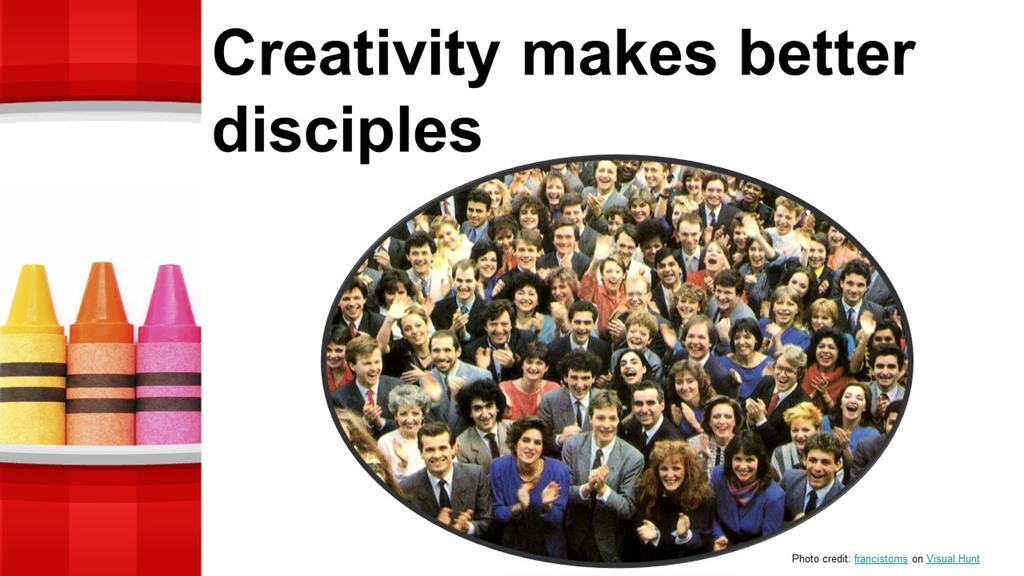 In this series, we’re reminded of our call to use our creativity to become better disciples of Jesus. As a disciple, the end goal isn’t to convert the world (that’s God’s work), but to be witnesses which means exhibiting such characteristics in our lives. If we were to receive a report card from God, it could have these nine items listed. How would we do? Would our grades be high enough to make our parents proud?
In this series, we’re reminded of our call to use our creativity to become better disciples of Jesus. As a disciple, the end goal isn’t to convert the world (that’s God’s work), but to be witnesses which means exhibiting such characteristics in our lives. If we were to receive a report card from God, it could have these nine items listed. How would we do? Would our grades be high enough to make our parents proud? Before we get into the individual items, let me suggest that they are to be taken as a whole. We don’t have nine different fruits of the spirit, like you might have apples and pears, bananas and pineapples. Instead, we are to have “fruit of the spirit.”
Before we get into the individual items, let me suggest that they are to be taken as a whole. We don’t have nine different fruits of the spirit, like you might have apples and pears, bananas and pineapples. Instead, we are to have “fruit of the spirit.” Now let’s look at each of these traits. Love: It’s been said that love always implies a personal investment in the object of love.”
Now let’s look at each of these traits. Love: It’s been said that love always implies a personal investment in the object of love.” The second trait we should be showing is joy. This is a hard one for we tend to think about joy as the person always smiling and laughing, forgetting the truth of that old Smokey Robinson song, “The Tears of a Clown.” We think of joy when the war is over and everyone celebrates in the street or when your favorite team wins the World Series, but such joy is fleeting. Paul encourages us to have joy even in times of trouble and persecution.
The second trait we should be showing is joy. This is a hard one for we tend to think about joy as the person always smiling and laughing, forgetting the truth of that old Smokey Robinson song, “The Tears of a Clown.” We think of joy when the war is over and everyone celebrates in the street or when your favorite team wins the World Series, but such joy is fleeting. Paul encourages us to have joy even in times of trouble and persecution. The third trait we’ll show, if we are fruitful, is peace. Again, as with joy, peace is often misunderstood. Without war is what we think peace is, but the Biblical concept is much deeper. Peace has to do with a wholeness within ourselves. It’s a state of mind that keeps us from being overwhelmed when chaos (and war) surrounds us. Peace is an outcome of knowing and trusting God.
The third trait we’ll show, if we are fruitful, is peace. Again, as with joy, peace is often misunderstood. Without war is what we think peace is, but the Biblical concept is much deeper. Peace has to do with a wholeness within ourselves. It’s a state of mind that keeps us from being overwhelmed when chaos (and war) surrounds us. Peace is an outcome of knowing and trusting God. The next trait is patience. Again, think about how we often act. We want what we can get as soon as possible. When we want to go to the store or the club or wherever we’re going, and we are impatience when we get behind a slow driver or a driver who’s lost and looking at mailbox numbers. But as a believer, we should take a deep breath. We should realize the source of our frustration, such as the slow driver, may need a break. We don’t know what is going on in his or her life. Besides, what’s the worst that might happen? We’ll be a minute late? Give the person a break and be patient is the Christian response, but one in which many of us struggle.
The next trait is patience. Again, think about how we often act. We want what we can get as soon as possible. When we want to go to the store or the club or wherever we’re going, and we are impatience when we get behind a slow driver or a driver who’s lost and looking at mailbox numbers. But as a believer, we should take a deep breath. We should realize the source of our frustration, such as the slow driver, may need a break. We don’t know what is going on in his or her life. Besides, what’s the worst that might happen? We’ll be a minute late? Give the person a break and be patient is the Christian response, but one in which many of us struggle. Kindness goes without saying. Again, God has shown kindness to us and calls us to show kindness and mercy to one another.
Kindness goes without saying. Again, God has shown kindness to us and calls us to show kindness and mercy to one another.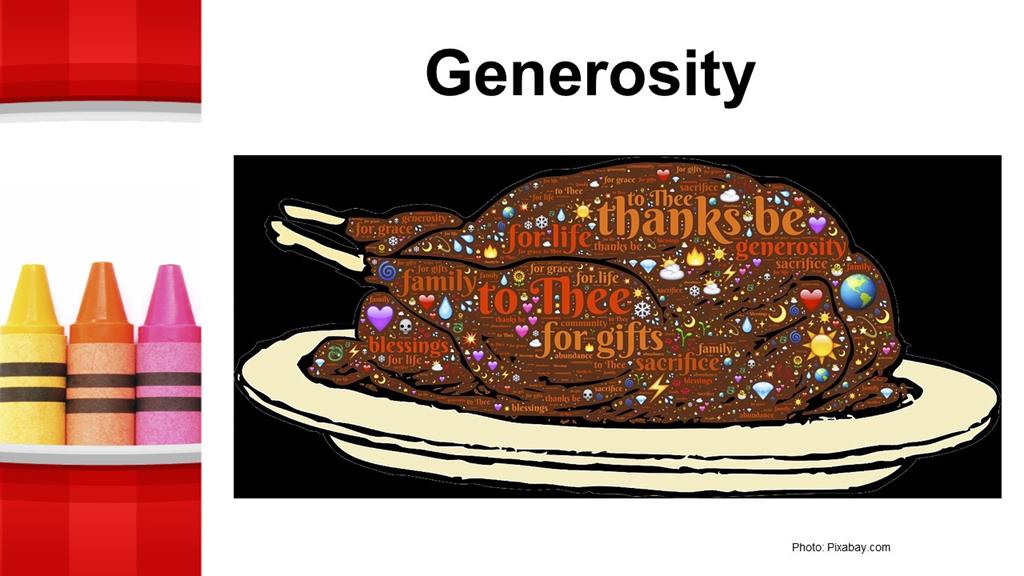 Next comes generosity. Again, in giving His Son, God has been generous with us, and we are to therefore be generous to one another.
Next comes generosity. Again, in giving His Son, God has been generous with us, and we are to therefore be generous to one another.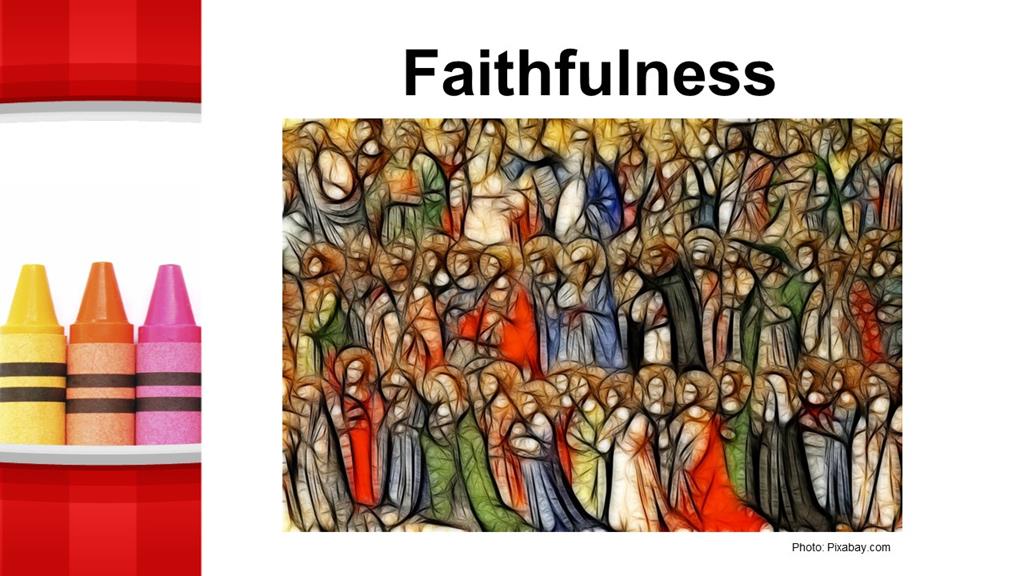
 Gentleness is another godly trait. Remember the parable of the forgiven servant that Jesus taught?
Gentleness is another godly trait. Remember the parable of the forgiven servant that Jesus taught? Going with gentleness is self-control. Self-control implies the discipline of an athlete; a metaphor Paul uses to describe the Christian faith.
Going with gentleness is self-control. Self-control implies the discipline of an athlete; a metaphor Paul uses to describe the Christian faith.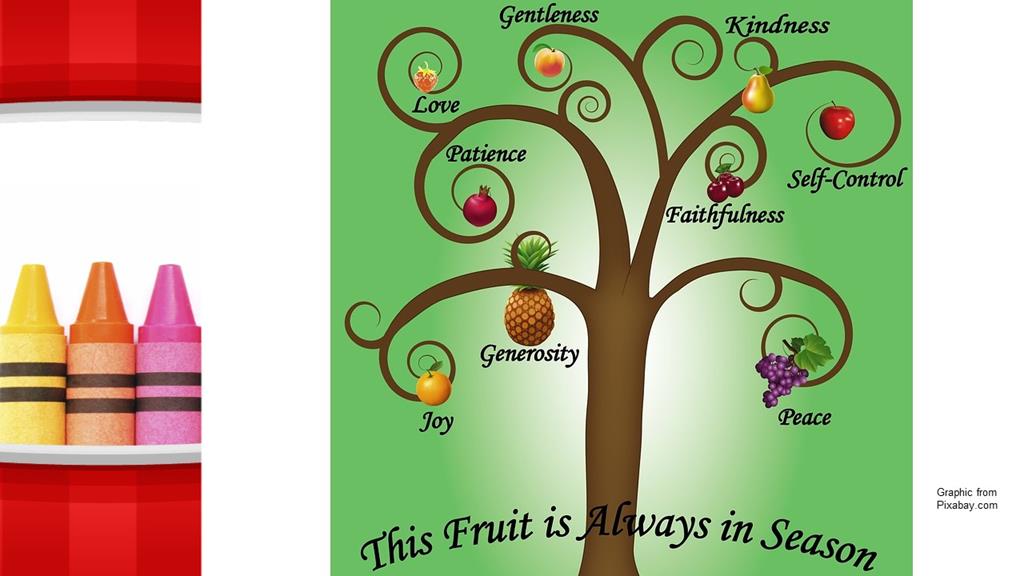 We have witnessed God displaying all these traits that make up the “fruit of the Spirit.” Now it’s our turn to learn from life of Jesus and to show such grace to others. Doing so will make this world a better place for all God’s people. Amen.
We have witnessed God displaying all these traits that make up the “fruit of the Spirit.” Now it’s our turn to learn from life of Jesus and to show such grace to others. Doing so will make this world a better place for all God’s people. Amen.
 Have you ever felt like you’re taking two steps forward and one step back? Sometimes life’s that way. It’s like climbing a cinder cone volcano. The ground is made of ash and is so unstable that you literally take two steps up and then slide back. You just hope to make progress. A 700-foot climb can take forever. But isn’t that how much of life is?
Have you ever felt like you’re taking two steps forward and one step back? Sometimes life’s that way. It’s like climbing a cinder cone volcano. The ground is made of ash and is so unstable that you literally take two steps up and then slide back. You just hope to make progress. A 700-foot climb can take forever. But isn’t that how much of life is?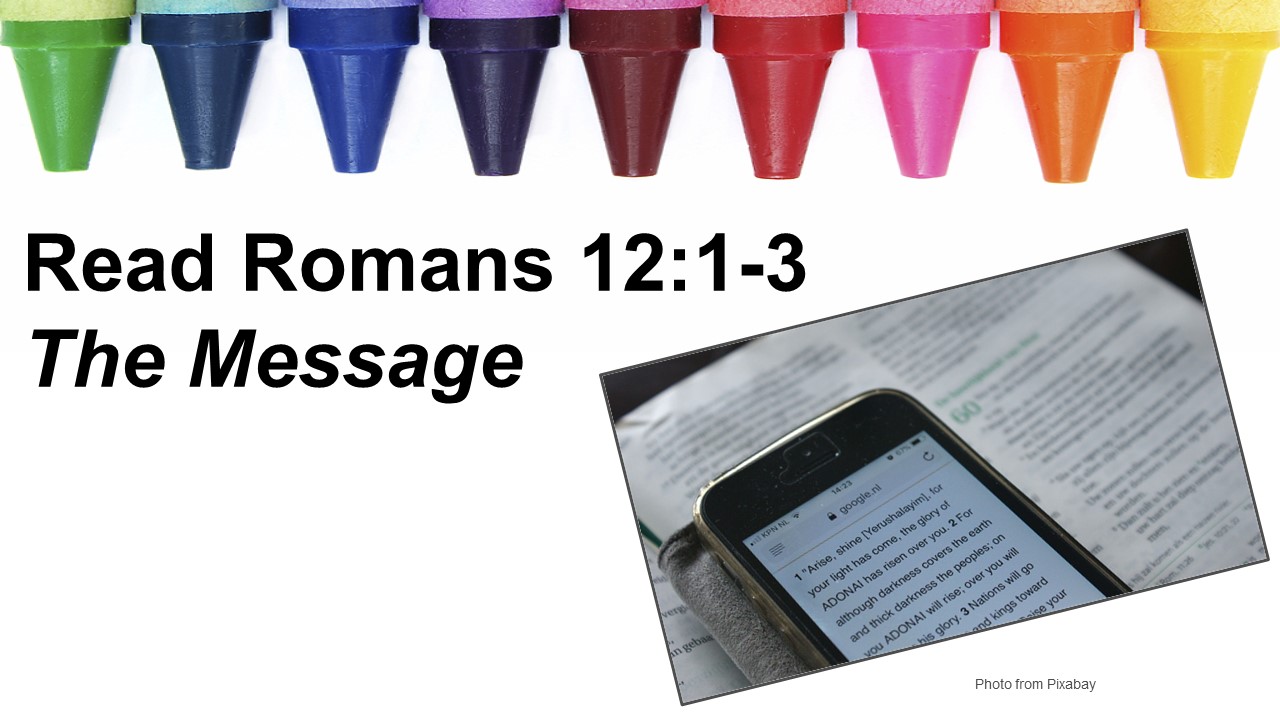

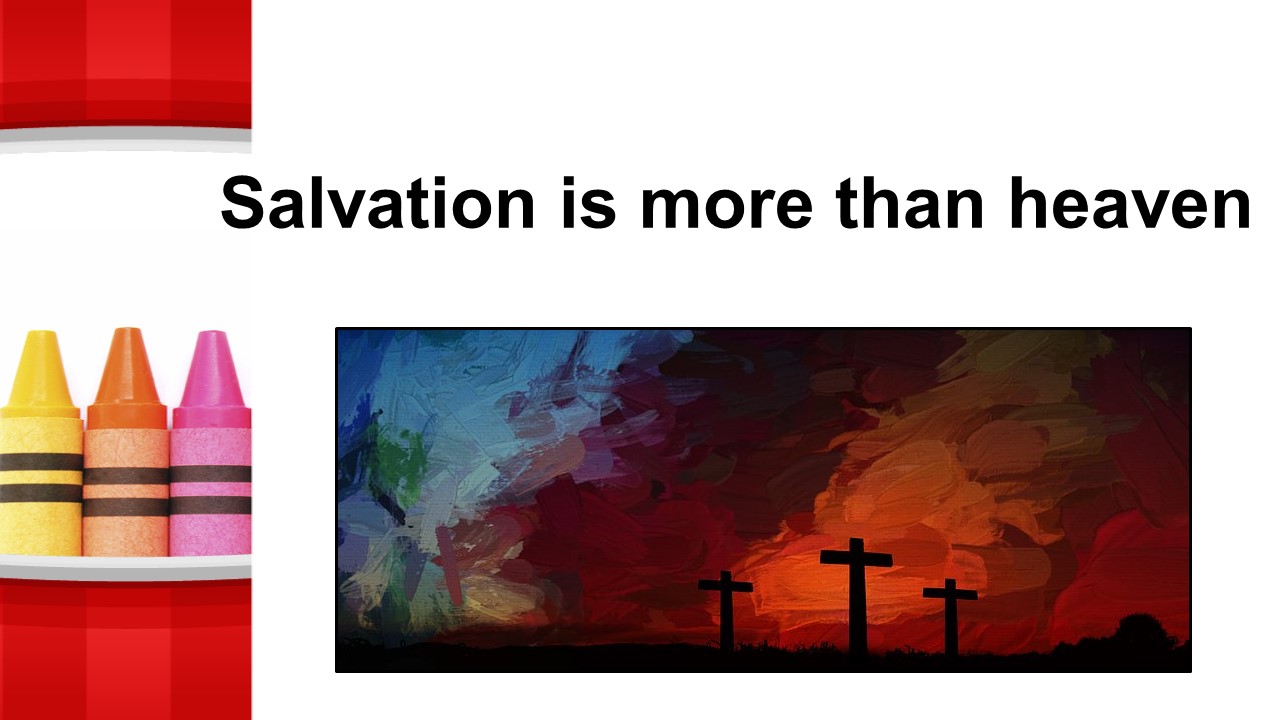
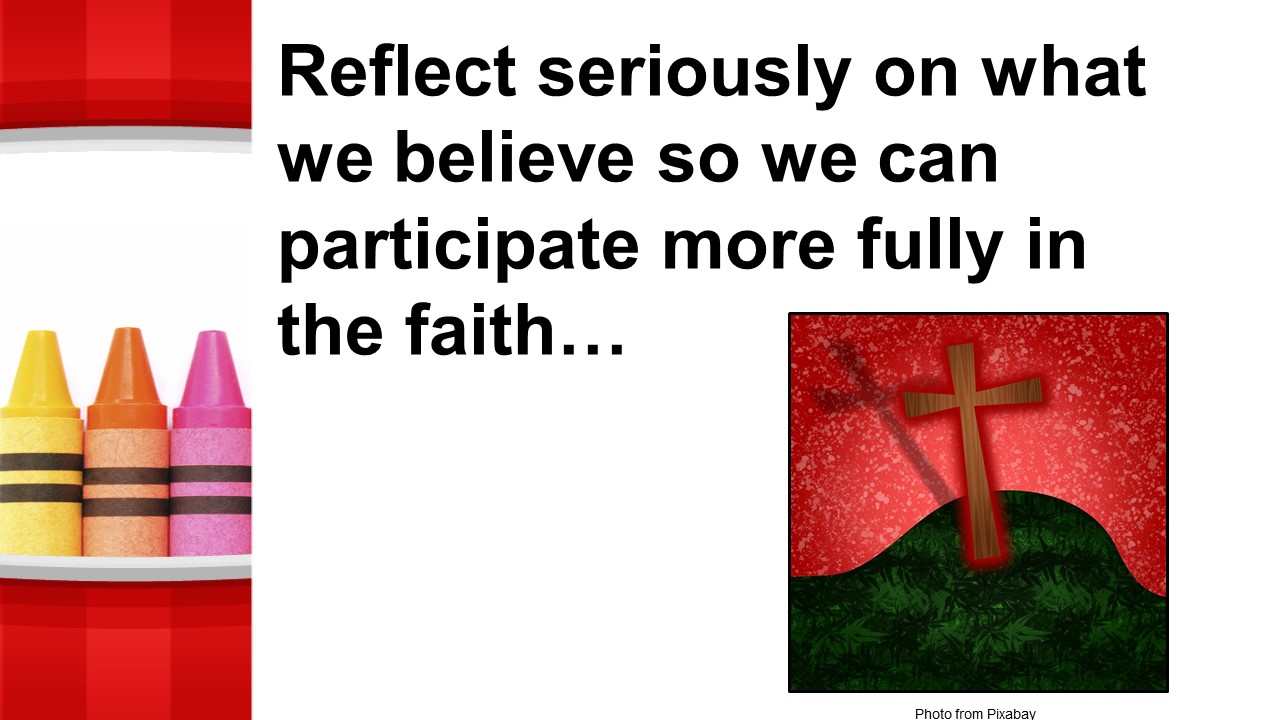
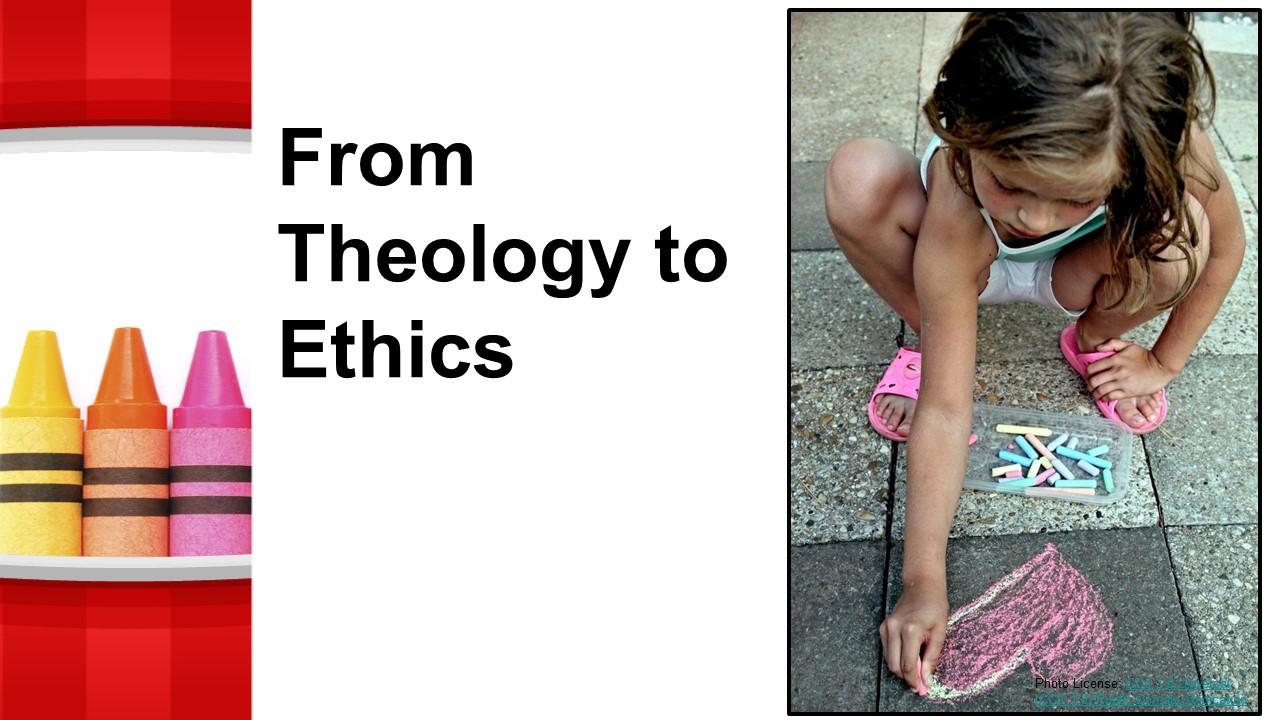

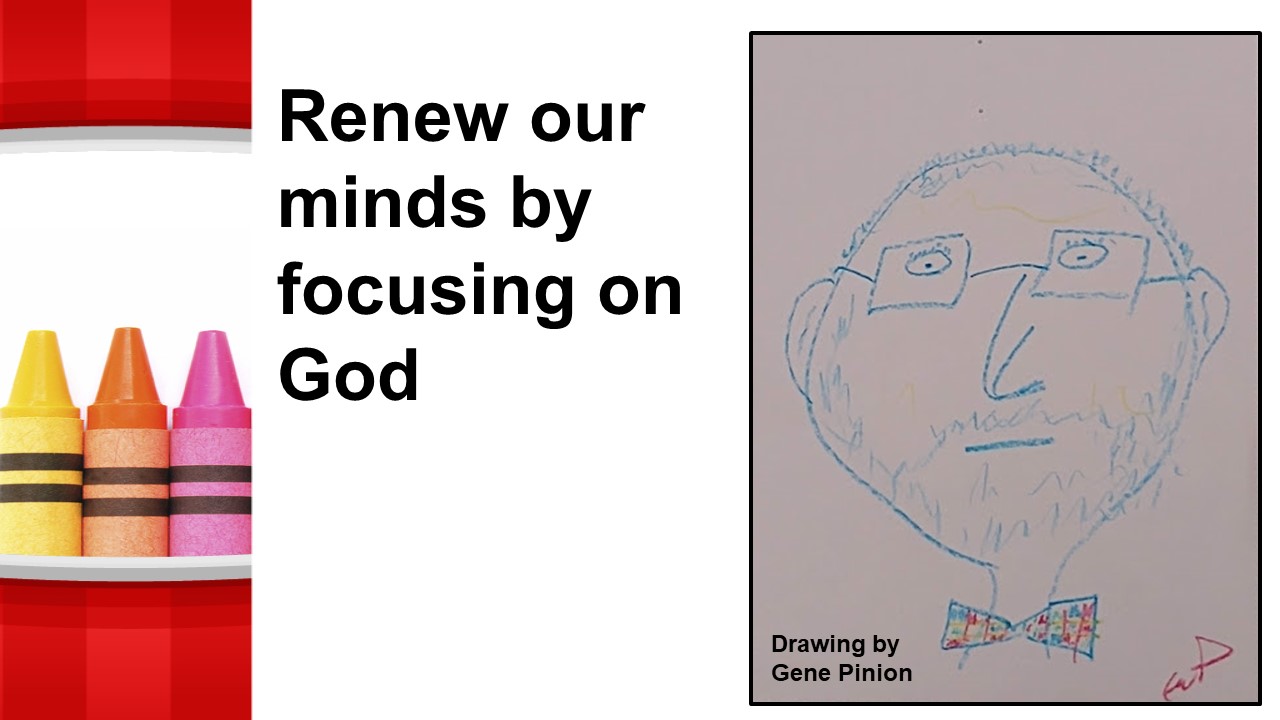 Instead of letting the world shape our thoughts and actions, we’re to renew our minds by focusing on God. In John Ortberg’s book, the me I want to be (which I believe our Serendipity class studied a few years ago), we’re reminded of the power of a habit and how our thought patterns are as habitual as brushing our teeth.
Instead of letting the world shape our thoughts and actions, we’re to renew our minds by focusing on God. In John Ortberg’s book, the me I want to be (which I believe our Serendipity class studied a few years ago), we’re reminded of the power of a habit and how our thought patterns are as habitual as brushing our teeth.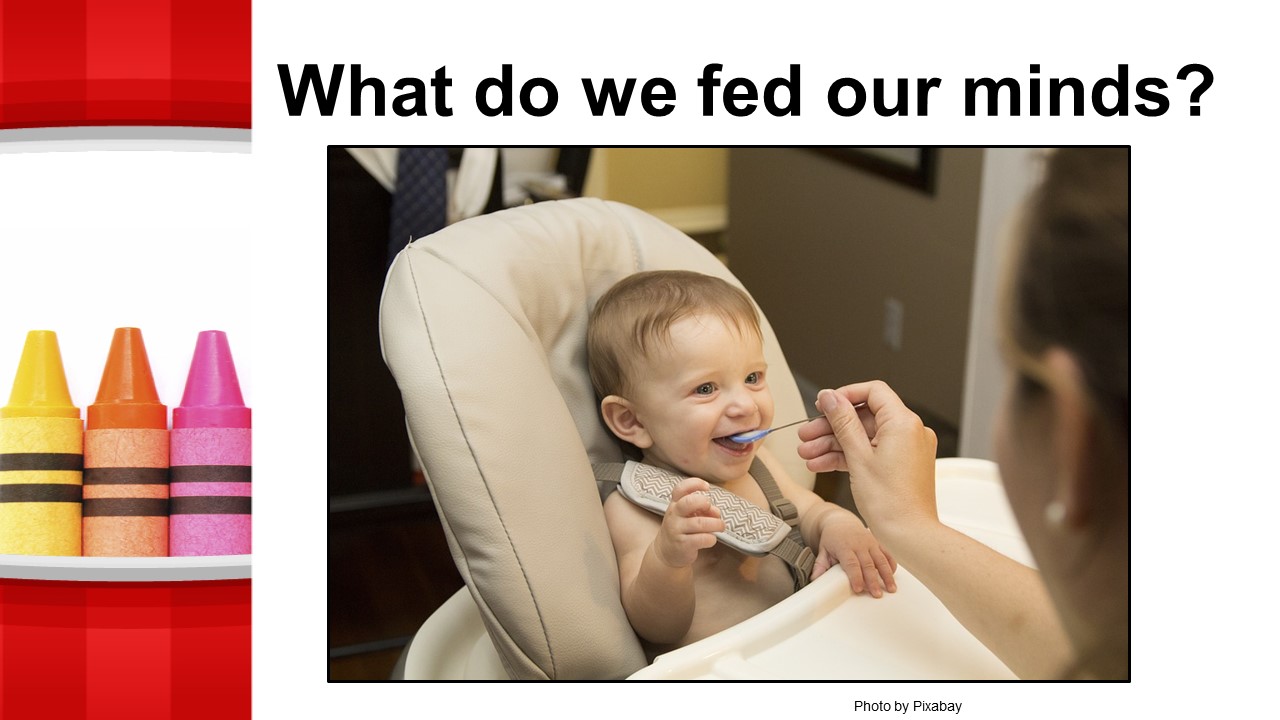 In Colossians, Paul encourages us to focus our minds on things above, not earthly things.
In Colossians, Paul encourages us to focus our minds on things above, not earthly things.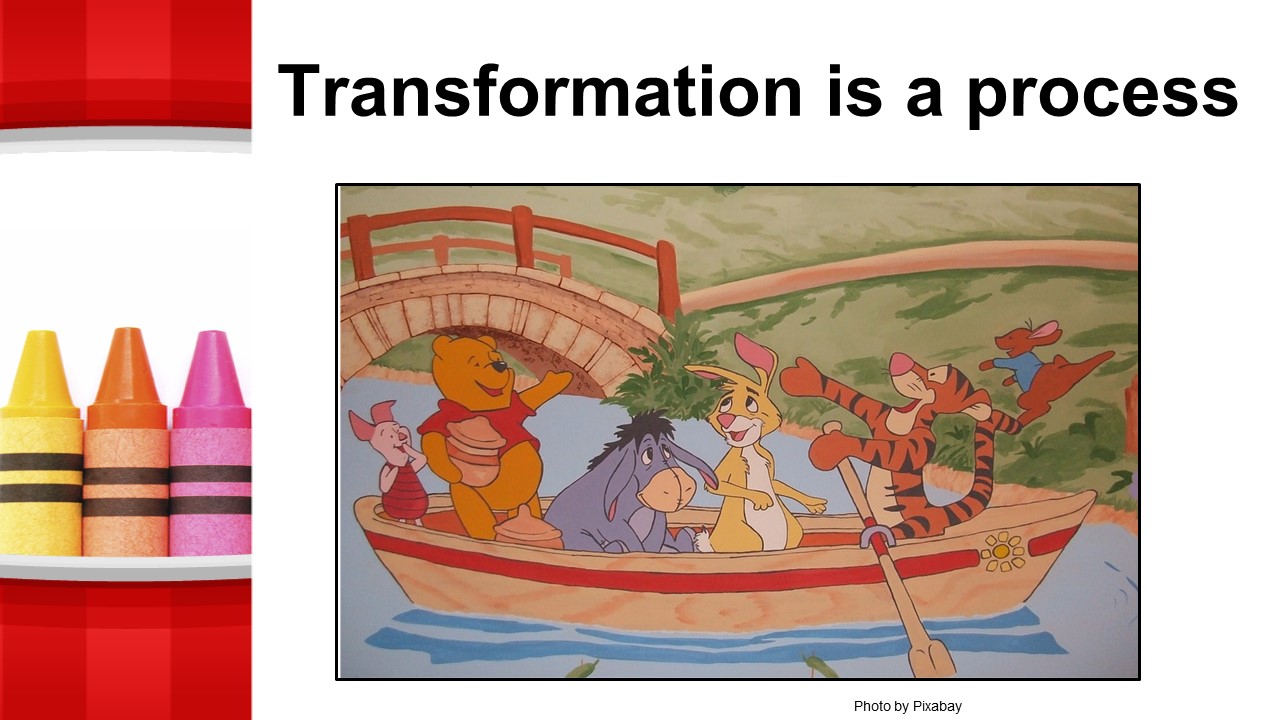 Paul isn’t suggesting here that we have an instant change, that all of a sudden go from being Eeyore to Winnie the Pooh, from being a sourpuss to the life of the party, from being depressed to hopeful. We’re to “be transformed.” Transformation implies a process. We don’t create habits overnight, so we can’t recreate new and better habits overnight.
Paul isn’t suggesting here that we have an instant change, that all of a sudden go from being Eeyore to Winnie the Pooh, from being a sourpuss to the life of the party, from being depressed to hopeful. We’re to “be transformed.” Transformation implies a process. We don’t create habits overnight, so we can’t recreate new and better habits overnight.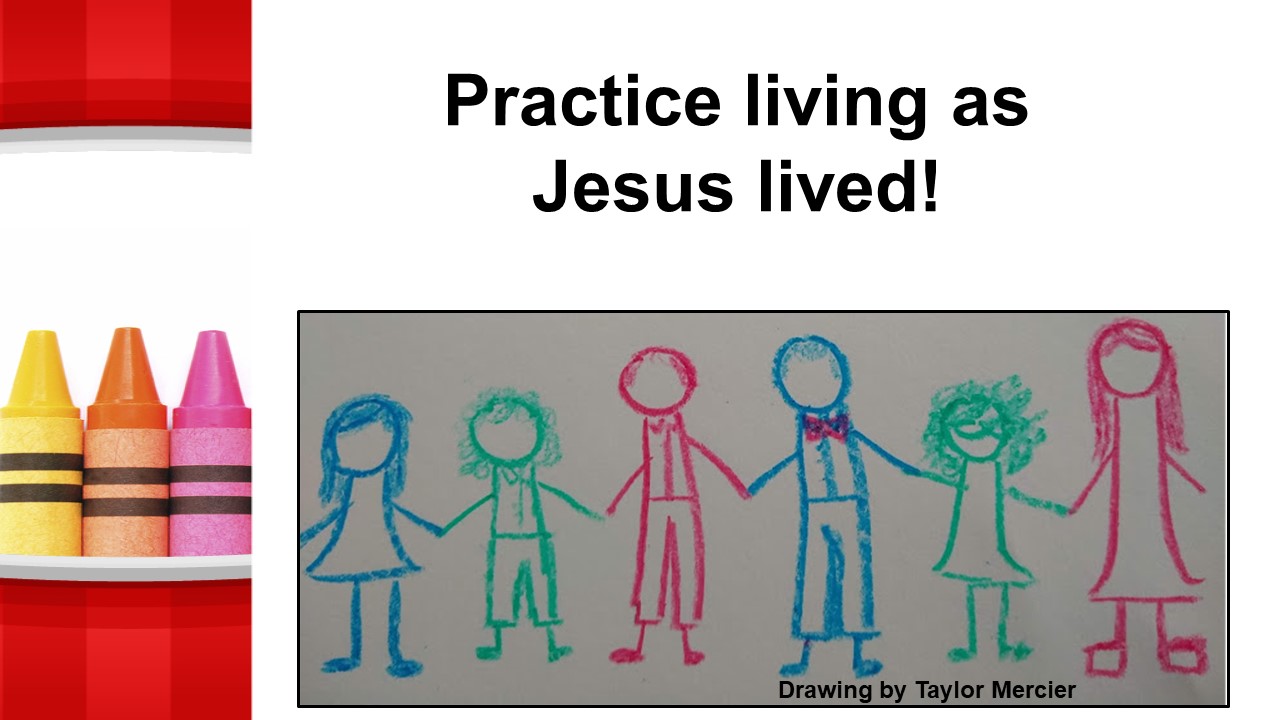 We need to embark on an effort to renew our minds. We need to drink deeply from the Scriptures as we read and study the Bible, individually and in groups. We need to ask God’s Spirit to guide, fill and help us learn to discern what God is doing in the world and how we can be a part of it. But we can’t just stop there. We’re not just to read the scriptures, we’re to “do something.” We practice living the life Jesus demonstrated. Unfortunately, as John Ortberg whom I quoted earlier, notes, we often debate doctrine and beliefs, tradition and interpretation, than do what Jesus said… “It’s easier to be smart than to be good.”
We need to embark on an effort to renew our minds. We need to drink deeply from the Scriptures as we read and study the Bible, individually and in groups. We need to ask God’s Spirit to guide, fill and help us learn to discern what God is doing in the world and how we can be a part of it. But we can’t just stop there. We’re not just to read the scriptures, we’re to “do something.” We practice living the life Jesus demonstrated. Unfortunately, as John Ortberg whom I quoted earlier, notes, we often debate doctrine and beliefs, tradition and interpretation, than do what Jesus said… “It’s easier to be smart than to be good.”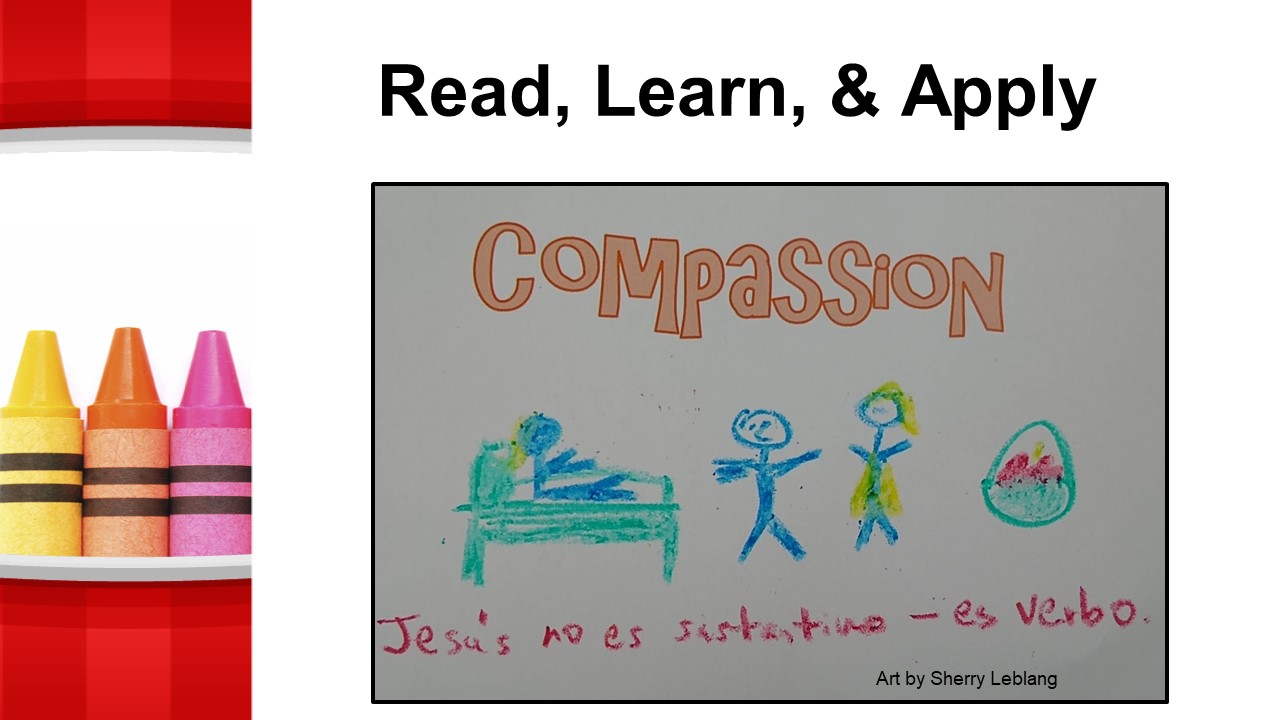 We read God’s words, we learn God’s nature by discussing the Word with others, and we apply it to our lives… Read, Learn and Apply. Don’t be conformed to this world, but be transformed by the renewing of your minds so that you may discern the will of God. Amen.
We read God’s words, we learn God’s nature by discussing the Word with others, and we apply it to our lives… Read, Learn and Apply. Don’t be conformed to this world, but be transformed by the renewing of your minds so that you may discern the will of God. Amen. Jeff Garrison
Jeff Garrison  In her book, Sailboat Church, Joan Gray writes: “the church’s divine nature is not always easy to see. Sometimes it takes great faith to believe that the church as we know it is the body of Christ. Sin is all too evident in our midst.” Sounds depression, doesn’t it? But Gray continues, assuring us it’s God’s way as she continues: “the church was never meant to be a group of holy people who are in themselves morally superior to everyone else.”
In her book, Sailboat Church, Joan Gray writes: “the church’s divine nature is not always easy to see. Sometimes it takes great faith to believe that the church as we know it is the body of Christ. Sin is all too evident in our midst.” Sounds depression, doesn’t it? But Gray continues, assuring us it’s God’s way as she continues: “the church was never meant to be a group of holy people who are in themselves morally superior to everyone else.”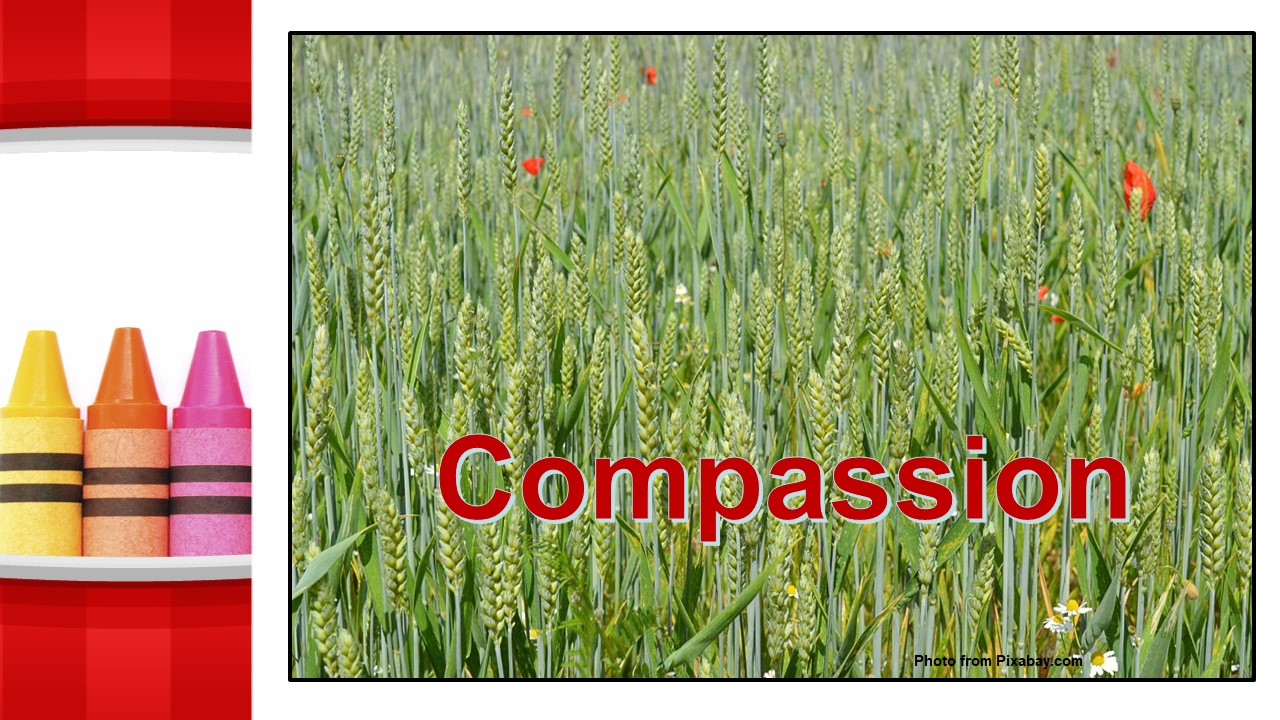 Let me say something that might be a bit controversial. Sin abounds within the church, within Christ’s body on earth. I used to think we should try to root it out, but I no longer do. Instead, maybe we should learn from the parable of the weeds and the wheat, and not risk rooting out the weeds less we also damage the wheat.
Let me say something that might be a bit controversial. Sin abounds within the church, within Christ’s body on earth. I used to think we should try to root it out, but I no longer do. Instead, maybe we should learn from the parable of the weeds and the wheat, and not risk rooting out the weeds less we also damage the wheat.
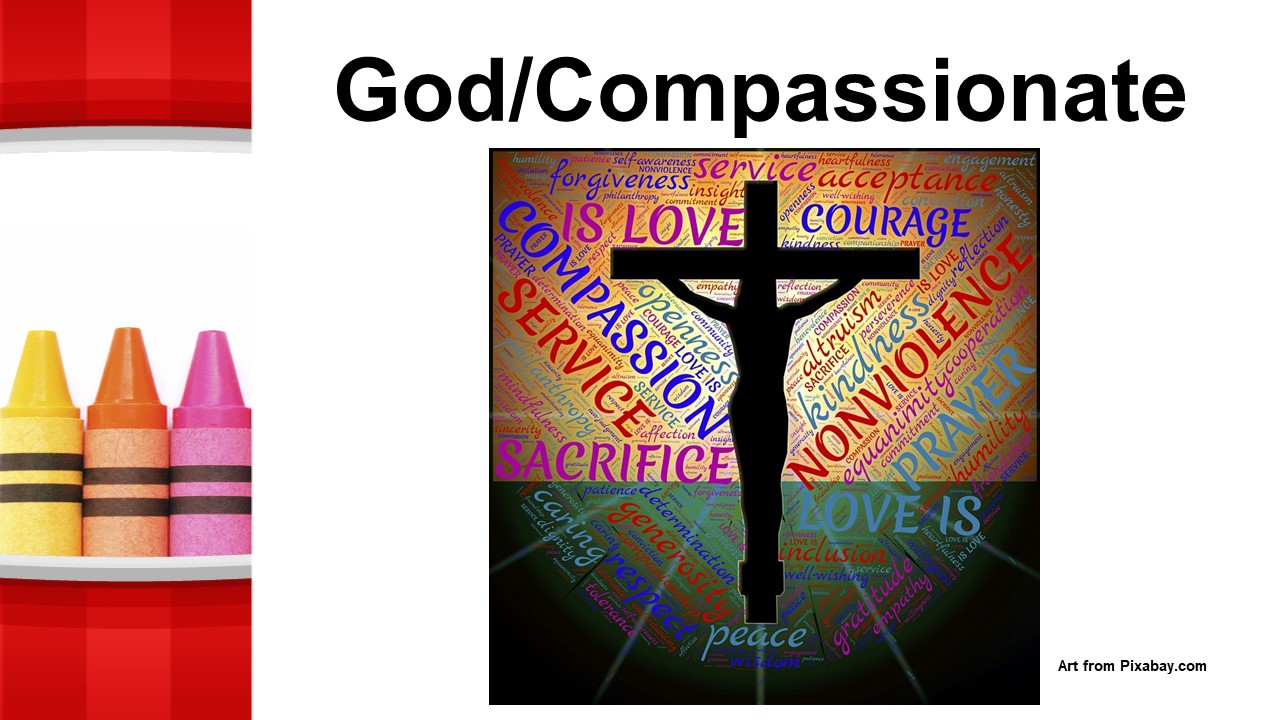 I wonder what our life of faith might look like if we, instead of referring to God as love, referred to God as compassionate. Both are correct. God is love, but in the English language, the word “love” has lost much of its power. As many of you, I’m sure, know, the Greeks had several words for love, erotic love, brotherly love, and compassionate love. We only have one word for love and apply that word too many things. We can love our spouse, our children, a sport team, a car, a sunset, good ice cream, a pair of shoes, a song on the radio… The list continues.
I wonder what our life of faith might look like if we, instead of referring to God as love, referred to God as compassionate. Both are correct. God is love, but in the English language, the word “love” has lost much of its power. As many of you, I’m sure, know, the Greeks had several words for love, erotic love, brotherly love, and compassionate love. We only have one word for love and apply that word too many things. We can love our spouse, our children, a sport team, a car, a sunset, good ice cream, a pair of shoes, a song on the radio… The list continues. It’s often pointed out that “love” should be a verb. It should lead us to action toward that for which we have affection. It’s not just a static or emotional feeling, but is something that manifested itself in action for the wellbeing of the other. In that way, it’s like compassion, being moved to work for the benefit of the other. God is compassionate as shown in sending us his Son, to offer the human race a chance to free itself from the muck which keep us stuck and bogged down in sin. Those of us who have experienced this compassion from God are to show such compassion to others.
It’s often pointed out that “love” should be a verb. It should lead us to action toward that for which we have affection. It’s not just a static or emotional feeling, but is something that manifested itself in action for the wellbeing of the other. In that way, it’s like compassion, being moved to work for the benefit of the other. God is compassionate as shown in sending us his Son, to offer the human race a chance to free itself from the muck which keep us stuck and bogged down in sin. Those of us who have experienced this compassion from God are to show such compassion to others.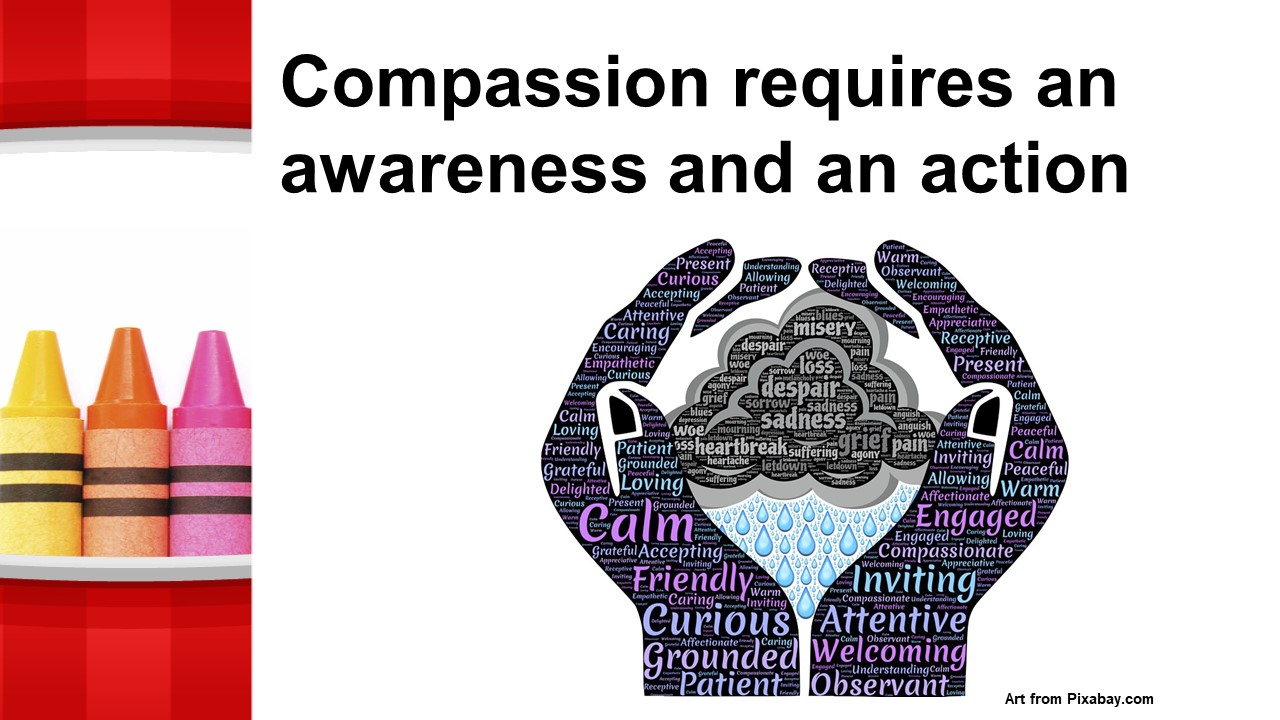 The word compassion, in English, implies an awareness of another’s distress, with a desire to help alleviate that distress in some manner. It has a deeper theological meaning, as it is linked to God’s actions. In the New Testament, the word compassion is used to describe Jesus or, used by Jesus to refer to God. Paul is the one who makes the link between the compassion of God, as we see in revelation of God in Jesus Christ, to our own call to be compassionate.
The word compassion, in English, implies an awareness of another’s distress, with a desire to help alleviate that distress in some manner. It has a deeper theological meaning, as it is linked to God’s actions. In the New Testament, the word compassion is used to describe Jesus or, used by Jesus to refer to God. Paul is the one who makes the link between the compassion of God, as we see in revelation of God in Jesus Christ, to our own call to be compassionate.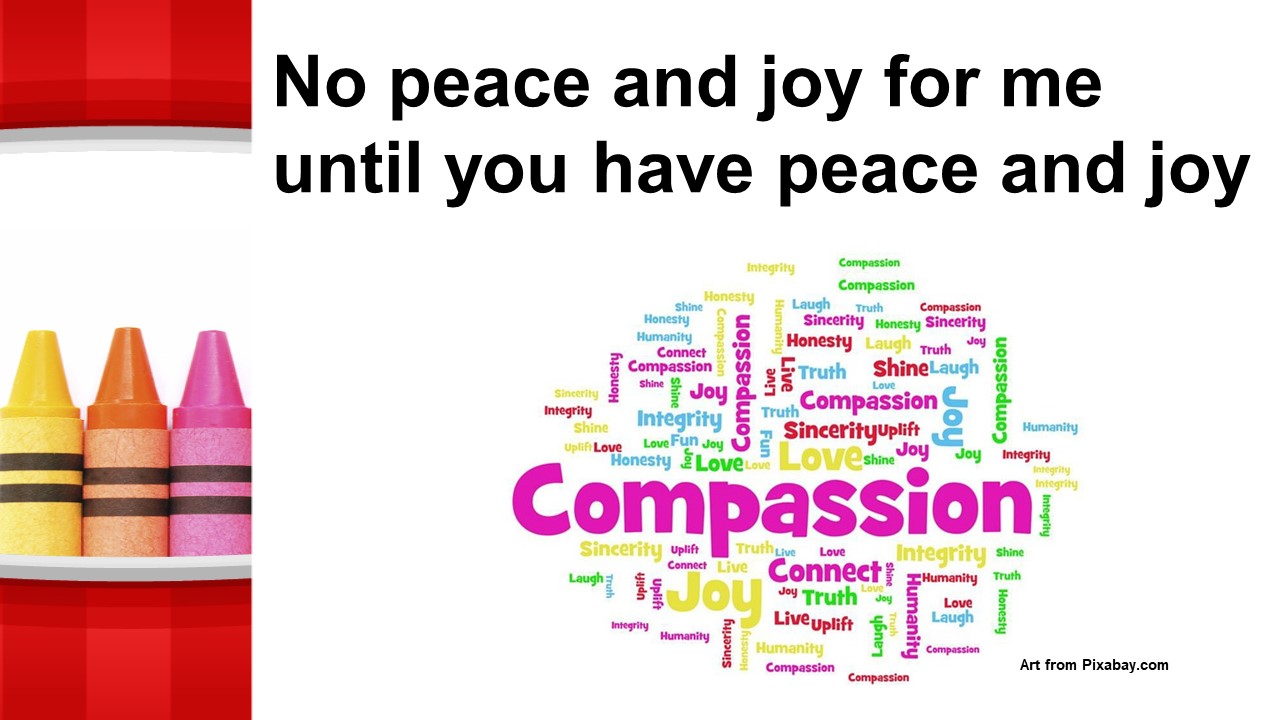 A modern writer defines compassion as “the knowledge that there can never really be any peace and joy for me until there is peace and joy finally for you too.”
A modern writer defines compassion as “the knowledge that there can never really be any peace and joy for me until there is peace and joy finally for you too.” Paul begins this section of his letter to the Philippians with a series of “if” clauses. This repetitiveness is tricky to translate, for we often use “if” to imply a dream. “If only this was real.” “If only this had happened…” But Paul’s use of the conditional cause doesn’t demonstrate a lack of certainty. Paul uses this litany of clauses to drive home a point. “If you believe this and if it’s made a difference in your life as it has in mine, then do this!” “If you have gotten anything out of following Christ, being in his Spirit-filled community, if you have a heart or an ounce of care, then you should act in this way.” Verse one is the lead up to how we should live as disciples, which is covered in verses 2 – 5.
Paul begins this section of his letter to the Philippians with a series of “if” clauses. This repetitiveness is tricky to translate, for we often use “if” to imply a dream. “If only this was real.” “If only this had happened…” But Paul’s use of the conditional cause doesn’t demonstrate a lack of certainty. Paul uses this litany of clauses to drive home a point. “If you believe this and if it’s made a difference in your life as it has in mine, then do this!” “If you have gotten anything out of following Christ, being in his Spirit-filled community, if you have a heart or an ounce of care, then you should act in this way.” Verse one is the lead up to how we should live as disciples, which is covered in verses 2 – 5.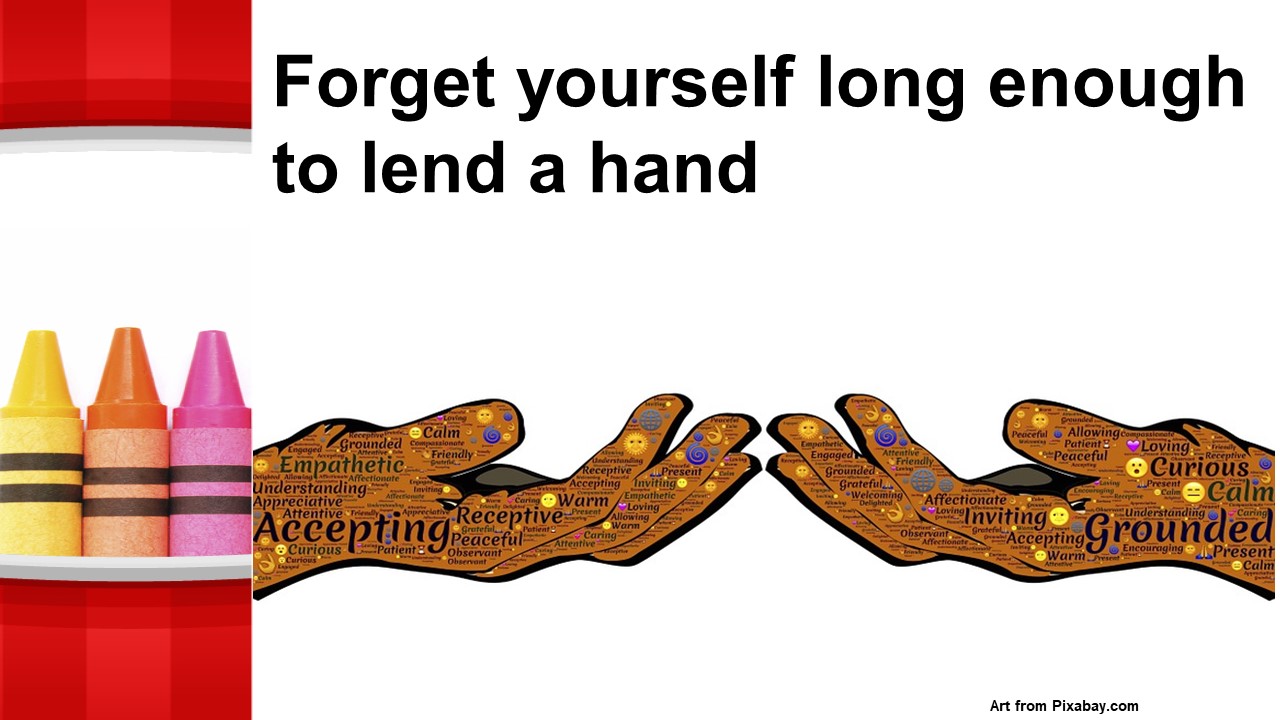 I love (there’s that word again) how The Message translates verse four: “Forget yourself long enough to lend a helping hand.” Paul’s talking about compassion. And then he drives this home as he tells us to be like Christ, the compassionate one. Starting with verse sixth, Paul appears to be quoting an early church hymn about Christ and he encourages us to imitate Christ’s compassion and humility. Instead of pushing and shoving and demanding that we get our “fair-share,” we’re to be Christ-like which means we lower ourselves in order to help others. In difficult situations, humility helps de-escalate tension.
I love (there’s that word again) how The Message translates verse four: “Forget yourself long enough to lend a helping hand.” Paul’s talking about compassion. And then he drives this home as he tells us to be like Christ, the compassionate one. Starting with verse sixth, Paul appears to be quoting an early church hymn about Christ and he encourages us to imitate Christ’s compassion and humility. Instead of pushing and shoving and demanding that we get our “fair-share,” we’re to be Christ-like which means we lower ourselves in order to help others. In difficult situations, humility helps de-escalate tension. You know, our lives tell a story. Whether we like it or not, how we live, what we care for, how we treat others, where we invest our talents and money, all combine to tell our story. As followers of Christ, our story will either compel others to check out our faith or it will repel them. If we realize this, it’s important that we strive to live in a way that will honor Jesus and show our trust in the Almighty. And that means to live compassionately. As one writer commented on this, “It’s not wise to name yourself as a Christian unless you are actually embodying the way of Messiah Jesus.”
You know, our lives tell a story. Whether we like it or not, how we live, what we care for, how we treat others, where we invest our talents and money, all combine to tell our story. As followers of Christ, our story will either compel others to check out our faith or it will repel them. If we realize this, it’s important that we strive to live in a way that will honor Jesus and show our trust in the Almighty. And that means to live compassionately. As one writer commented on this, “It’s not wise to name yourself as a Christian unless you are actually embodying the way of Messiah Jesus.” How might we be compassionate? We can look at the life of Jesus and live as he did? Or we might think of some of our contemporaries. Since last Sunday, we have lost a good one, a compassionate man. Jim Fendig was humble and soft spoken and concerned for others. And there are others like him within our community.
How might we be compassionate? We can look at the life of Jesus and live as he did? Or we might think of some of our contemporaries. Since last Sunday, we have lost a good one, a compassionate man. Jim Fendig was humble and soft spoken and concerned for others. And there are others like him within our community.


 Are we like that? Are we closed to the possibilities of what God might do through us? Are we resistant to the abilities of Almighty God, who can do more than can imagine? Perhaps, like the man in the story, we want to keep God hidden, focusing on ourselves, even though we don’t (by ourselves) have the ability to do miracles? But, you know, when we don’t care who gets the credit, great things can happen. And if it is happening with God, even greater things can happen.
Are we like that? Are we closed to the possibilities of what God might do through us? Are we resistant to the abilities of Almighty God, who can do more than can imagine? Perhaps, like the man in the story, we want to keep God hidden, focusing on ourselves, even though we don’t (by ourselves) have the ability to do miracles? But, you know, when we don’t care who gets the credit, great things can happen. And if it is happening with God, even greater things can happen.

 Our reading from the Apostle Paul’s letter to the church in Ephesus is a prayer. Paul prays his brothers and sisters in Ephesus will find strength in God’s spirit and that Christ might dwell in their hearts through faith rooted and grounded in love.
Our reading from the Apostle Paul’s letter to the church in Ephesus is a prayer. Paul prays his brothers and sisters in Ephesus will find strength in God’s spirit and that Christ might dwell in their hearts through faith rooted and grounded in love. By the way, this isn’t the only place where Paul emphasizes the importance of love. Yesterday, in the Men’s Saturday morning Bible Study, we looked at 1 Corinthians 13, which is known as the love chapter. There, Paul is insisting that the various factions within the Corinthian Church love one another. God loves us, as shown in Jesus Christ, and we are to love one another. It’s as simple as that. Even Sigmund Freud, who isn’t known for his Christian sympathies, said that we must love in order that we will not fall, and if we can’t love, illness will take over us.
By the way, this isn’t the only place where Paul emphasizes the importance of love. Yesterday, in the Men’s Saturday morning Bible Study, we looked at 1 Corinthians 13, which is known as the love chapter. There, Paul is insisting that the various factions within the Corinthian Church love one another. God loves us, as shown in Jesus Christ, and we are to love one another. It’s as simple as that. Even Sigmund Freud, who isn’t known for his Christian sympathies, said that we must love in order that we will not fall, and if we can’t love, illness will take over us.
 Maybe we, as Christians, need to do more daydreaming about what it means to be the people of God. That’s what this four week study is about. God has endowed in us an ability to image new worlds. But are we willing to join with God in creating them? Or do we limit God by our own lack of imagination. We need to free God to work miracles in our lives, within our congregation and community and within our world. If we trust God, and ground ourselves in agape love, which is the type of love that calls us to work for the best of others, there’s no limit to what might be accomplished. If we trust in God’s power and are willing to creatively join God in working for a better world, there is no telling what might come out of our efforts. But if we act like things depend on what we can do and have no imagination, we risk a dark dystopia future.
Maybe we, as Christians, need to do more daydreaming about what it means to be the people of God. That’s what this four week study is about. God has endowed in us an ability to image new worlds. But are we willing to join with God in creating them? Or do we limit God by our own lack of imagination. We need to free God to work miracles in our lives, within our congregation and community and within our world. If we trust God, and ground ourselves in agape love, which is the type of love that calls us to work for the best of others, there’s no limit to what might be accomplished. If we trust in God’s power and are willing to creatively join God in working for a better world, there is no telling what might come out of our efforts. But if we act like things depend on what we can do and have no imagination, we risk a dark dystopia future.

 The Israelites in exile were told to seek the wellbeing of the community in which they were living and we’re to do the same.
The Israelites in exile were told to seek the wellbeing of the community in which they were living and we’re to do the same.